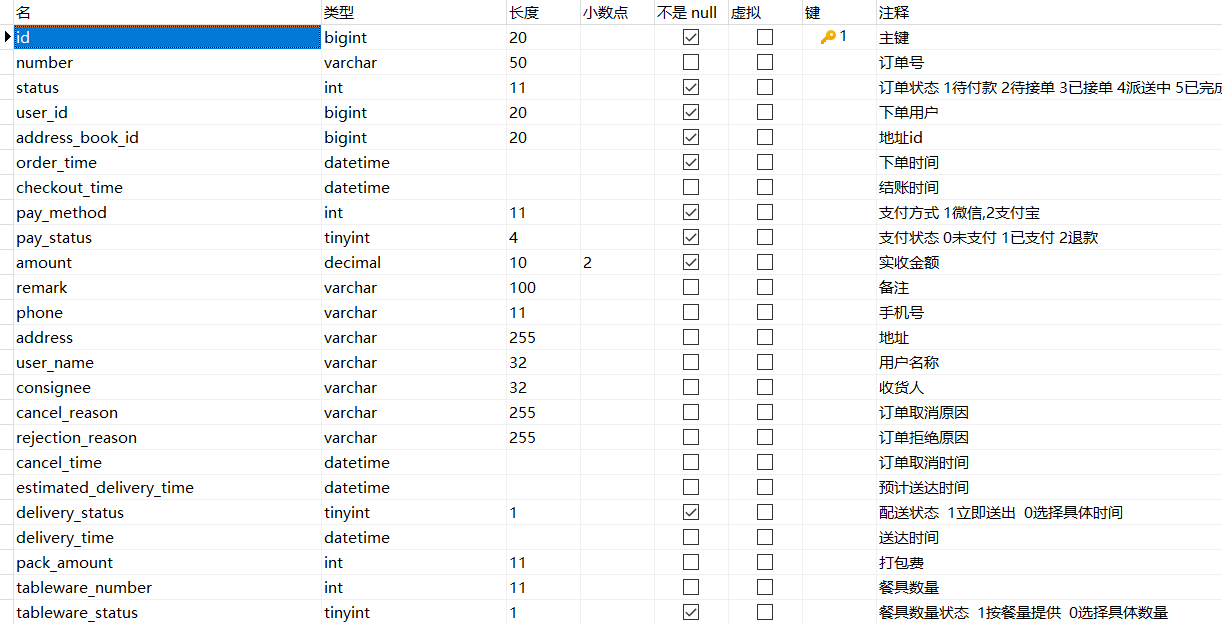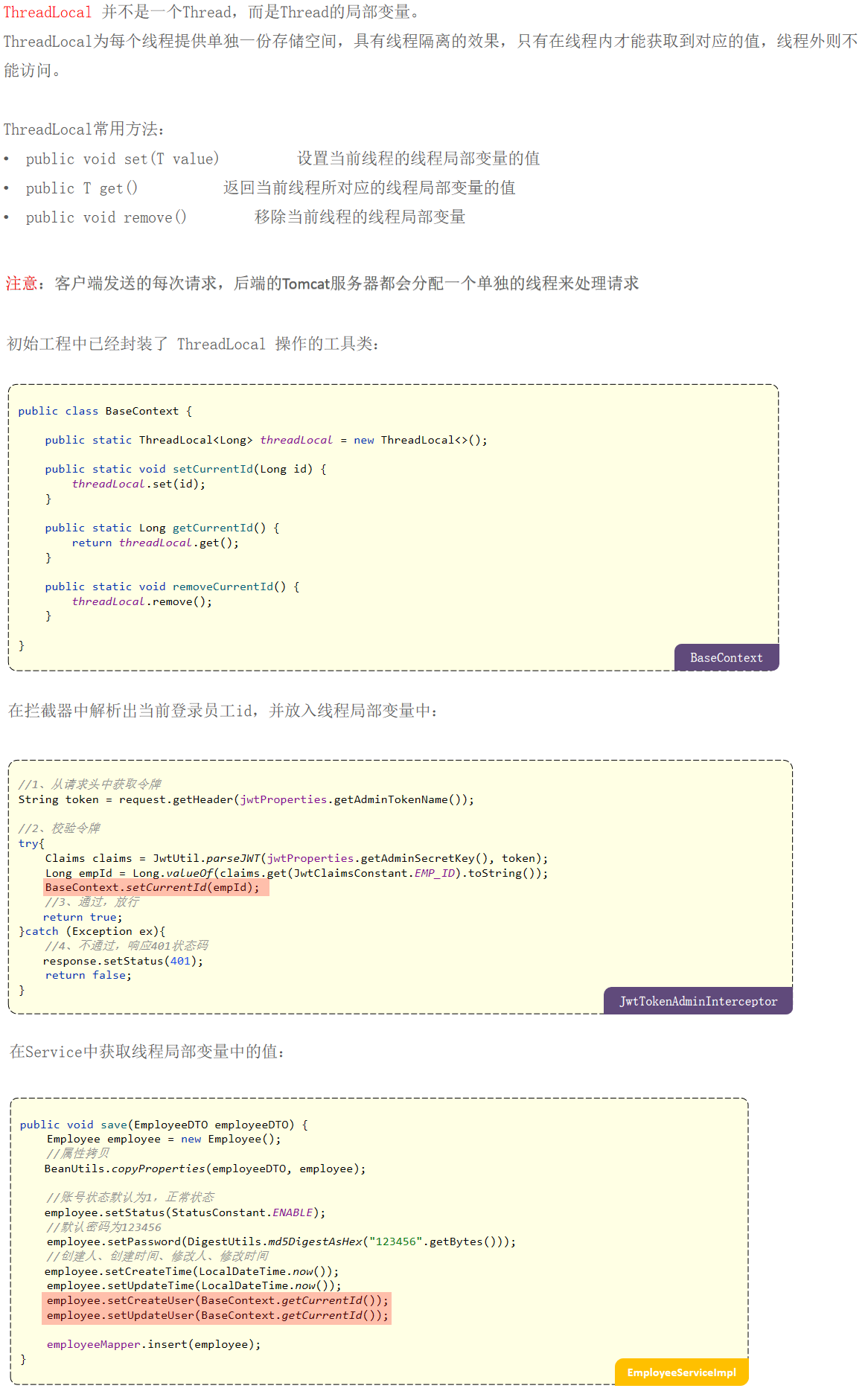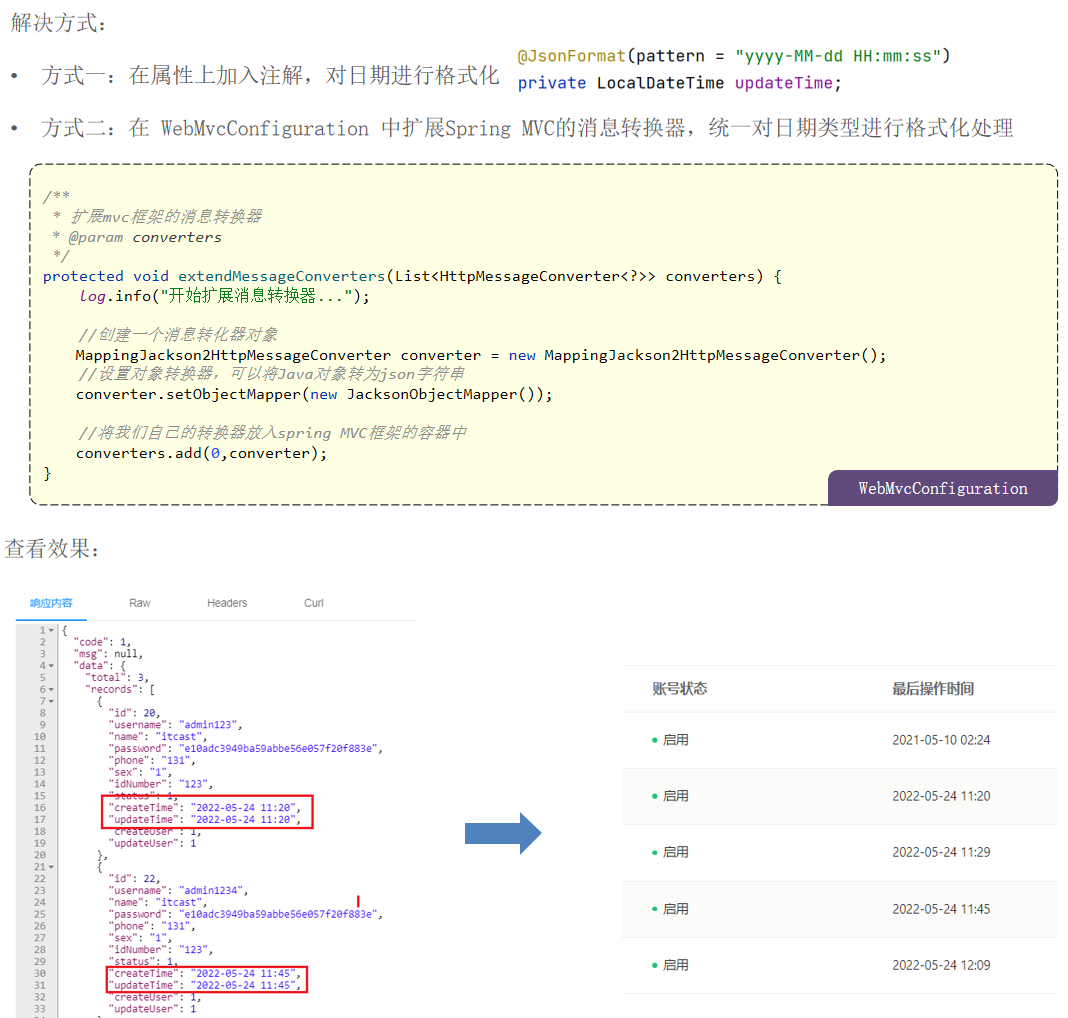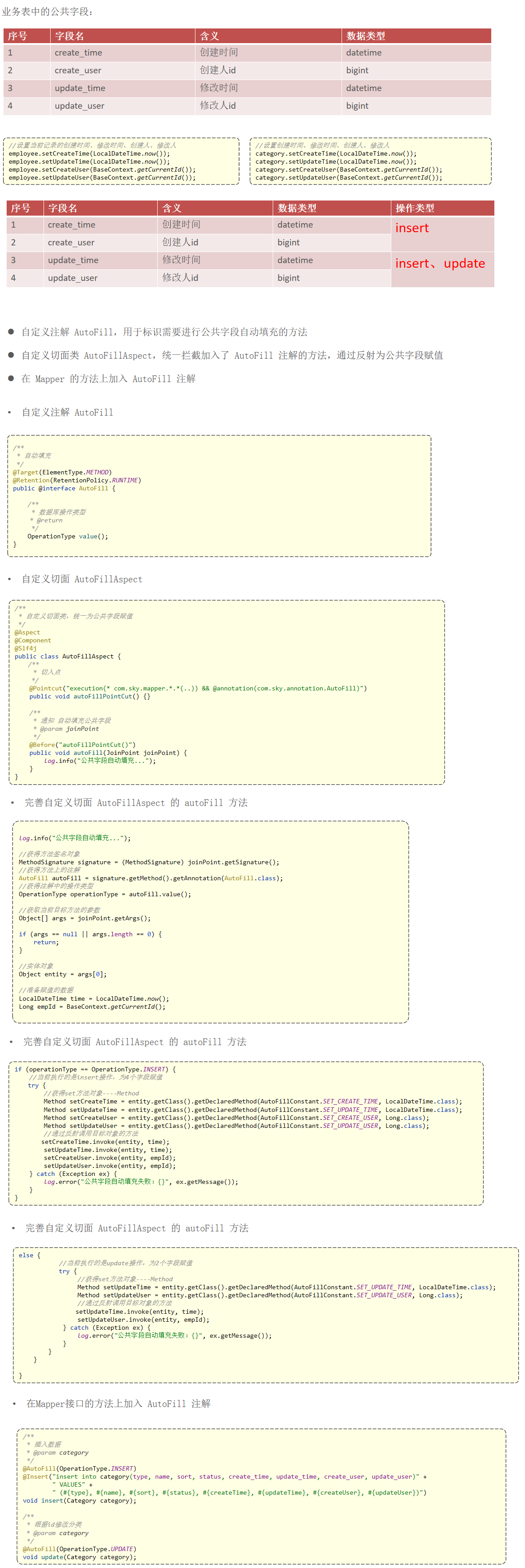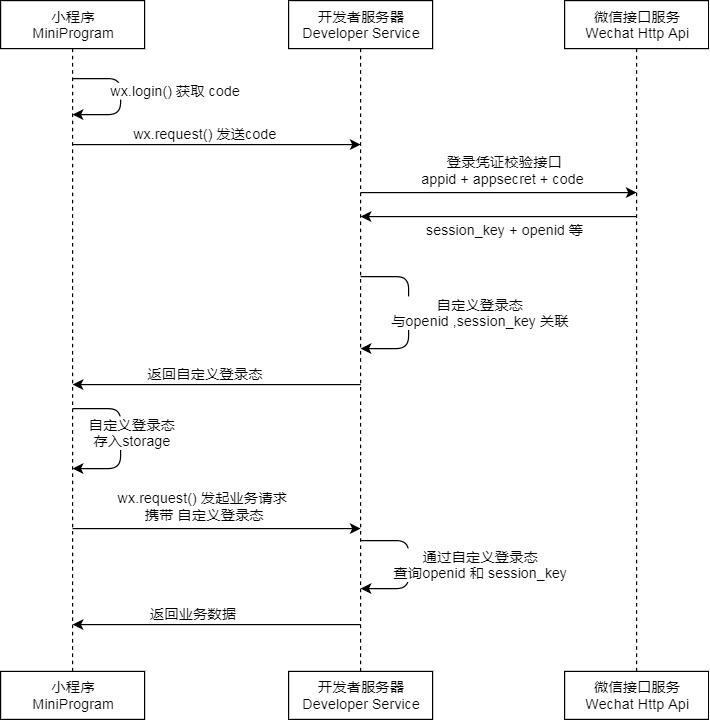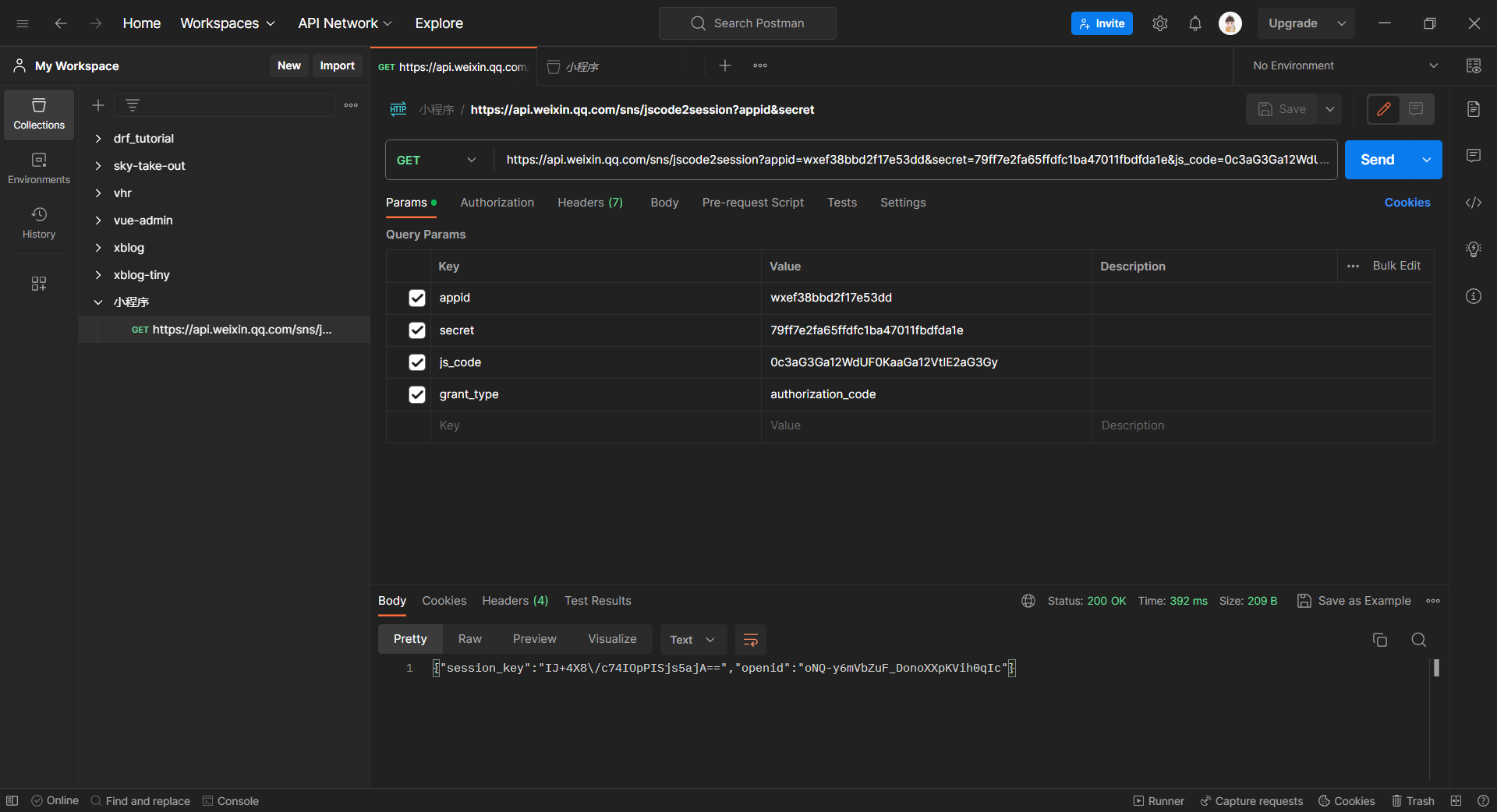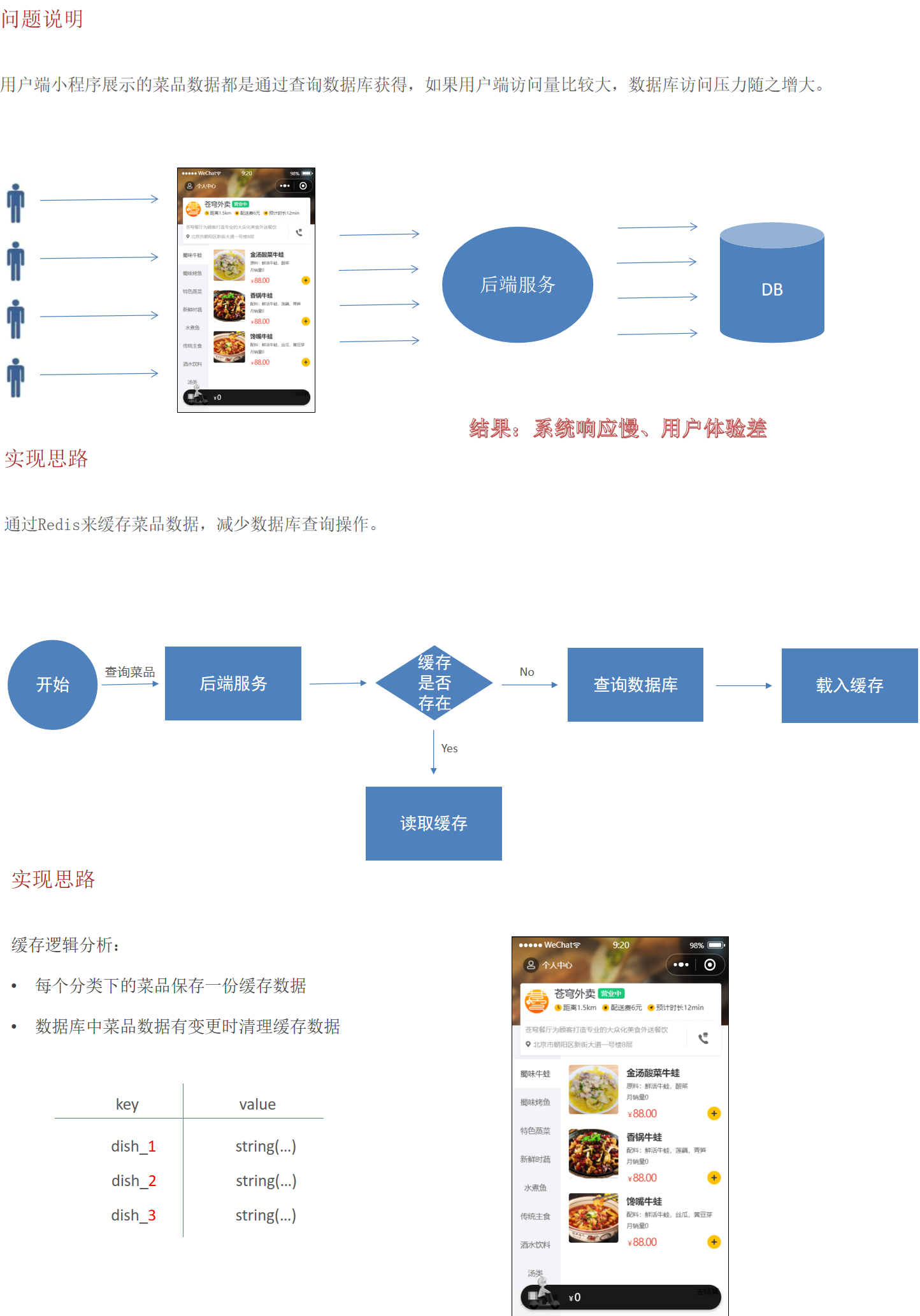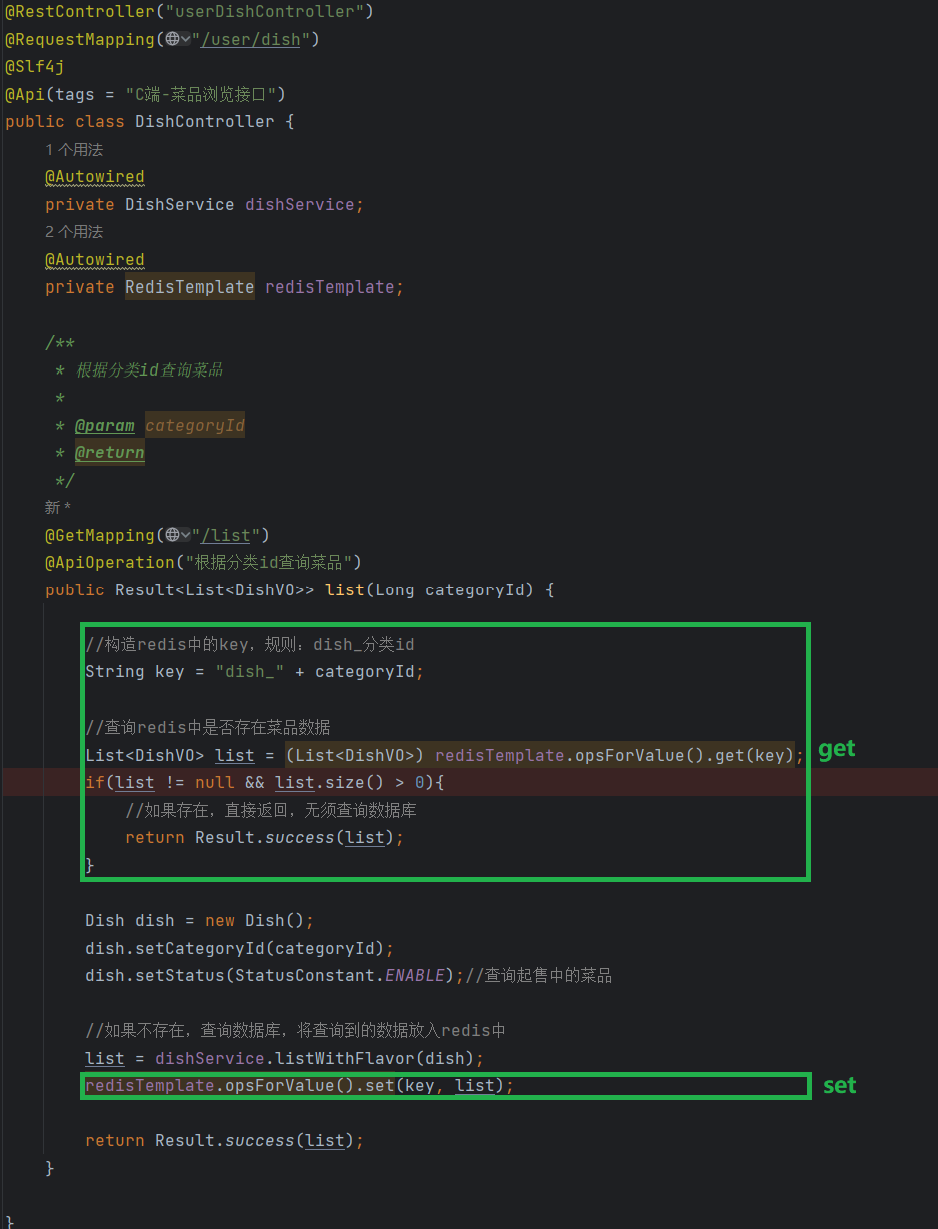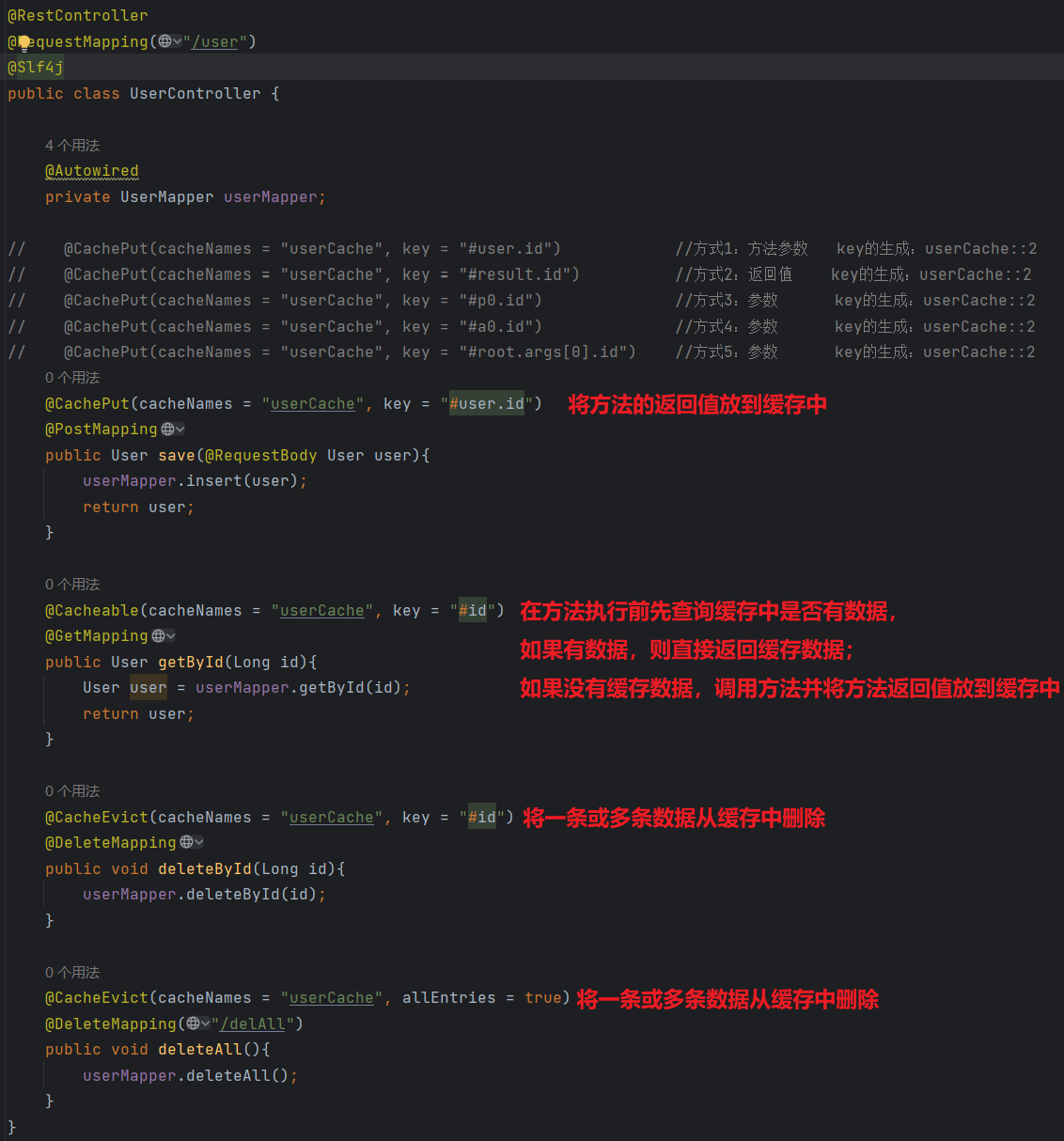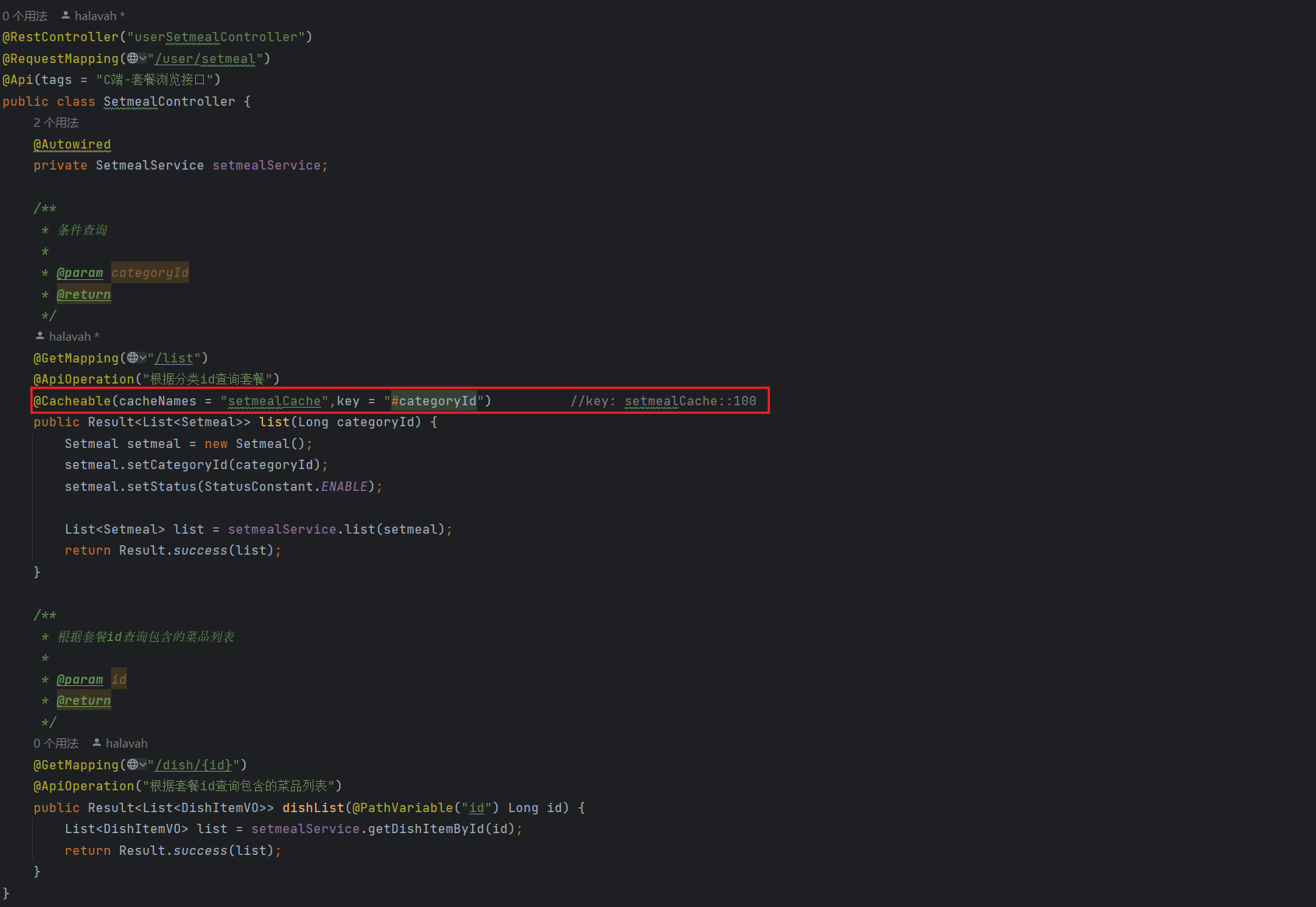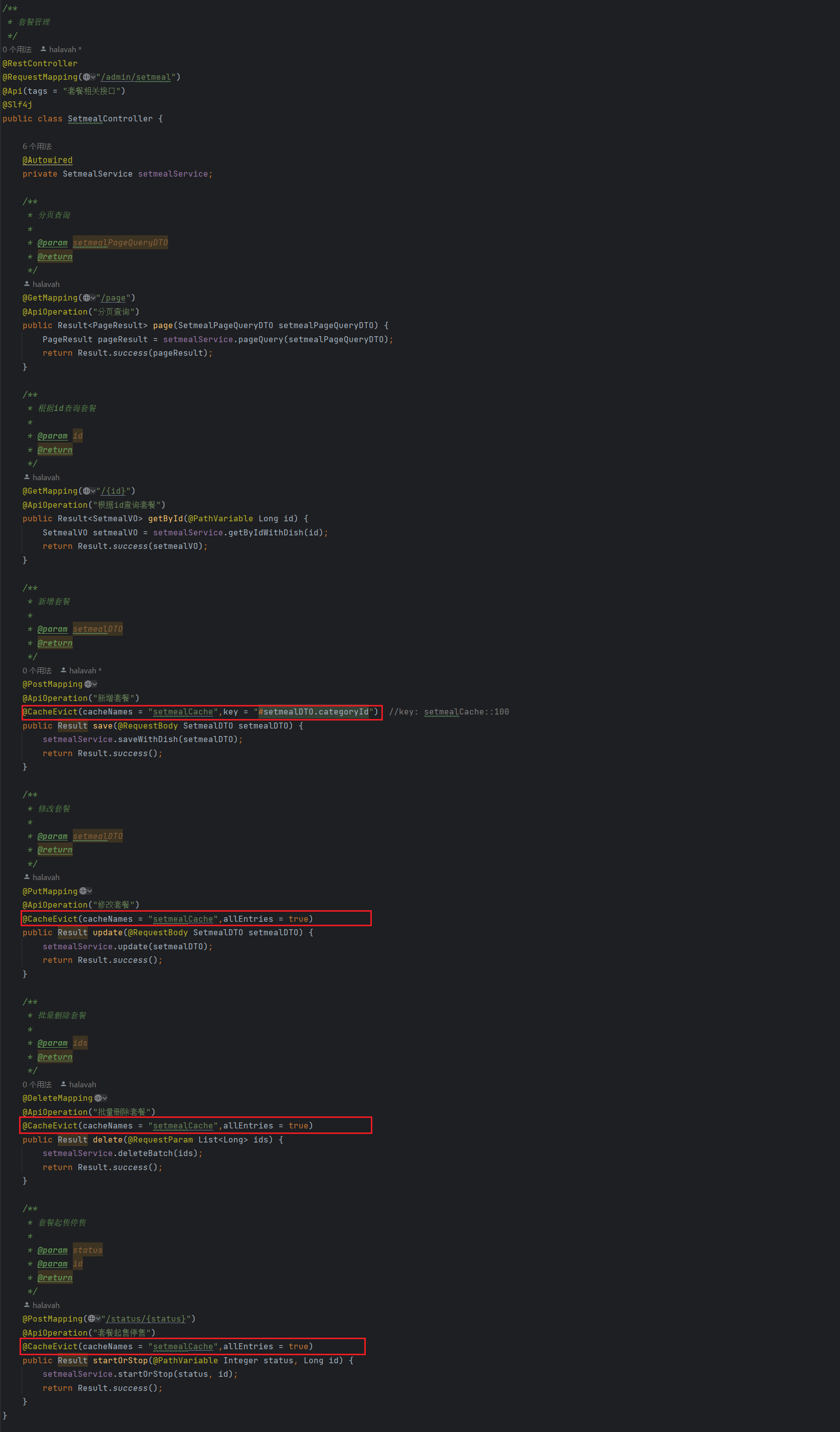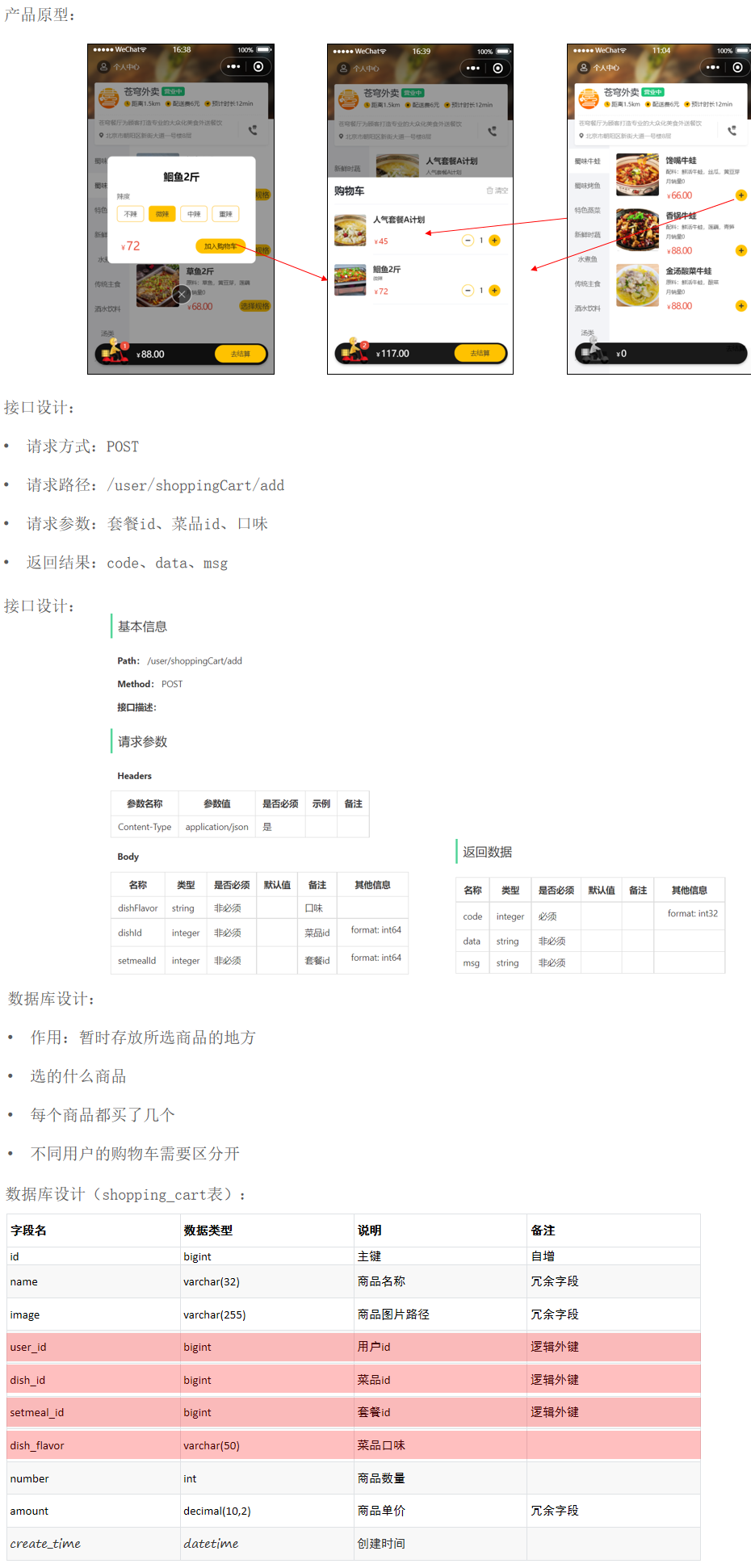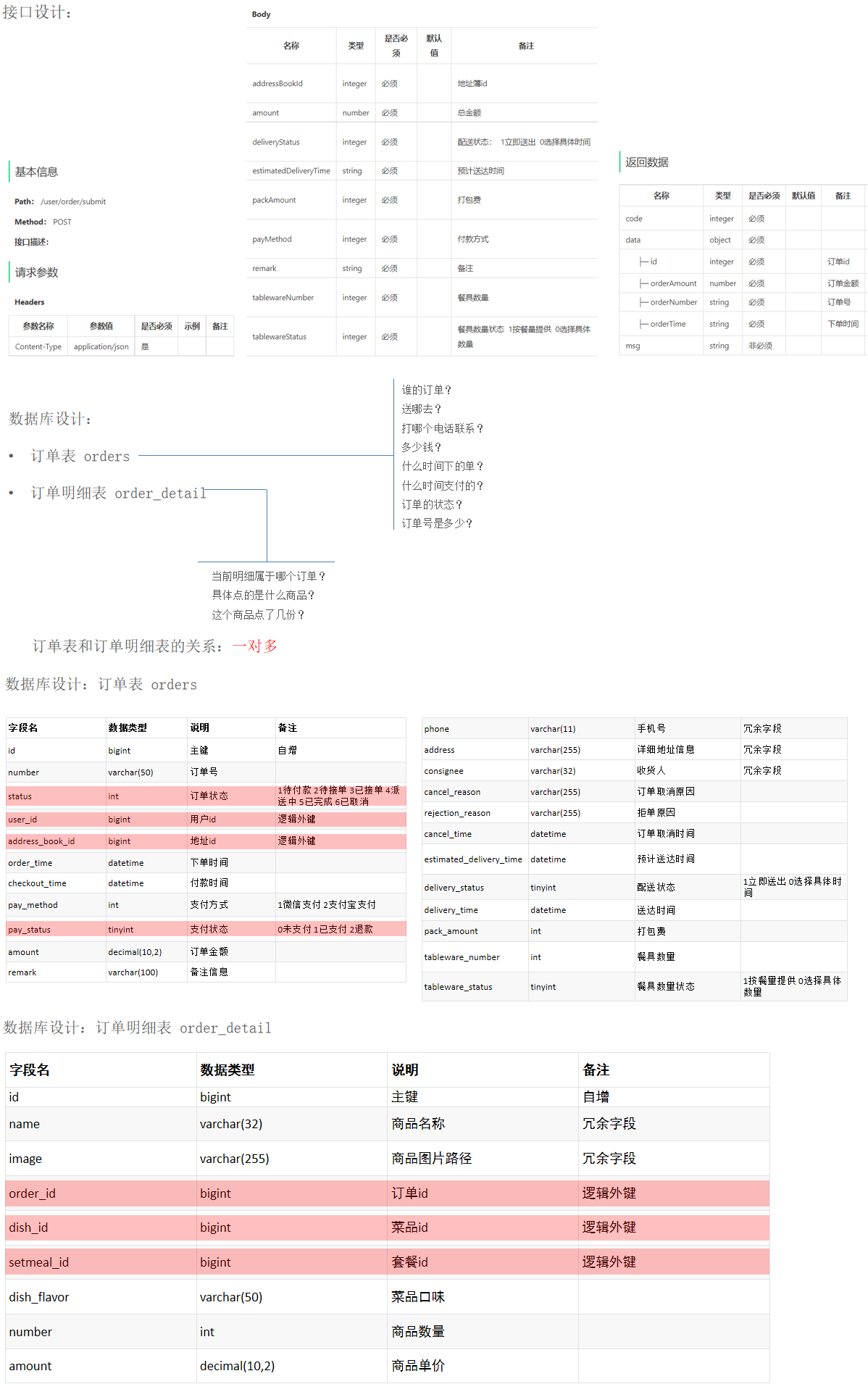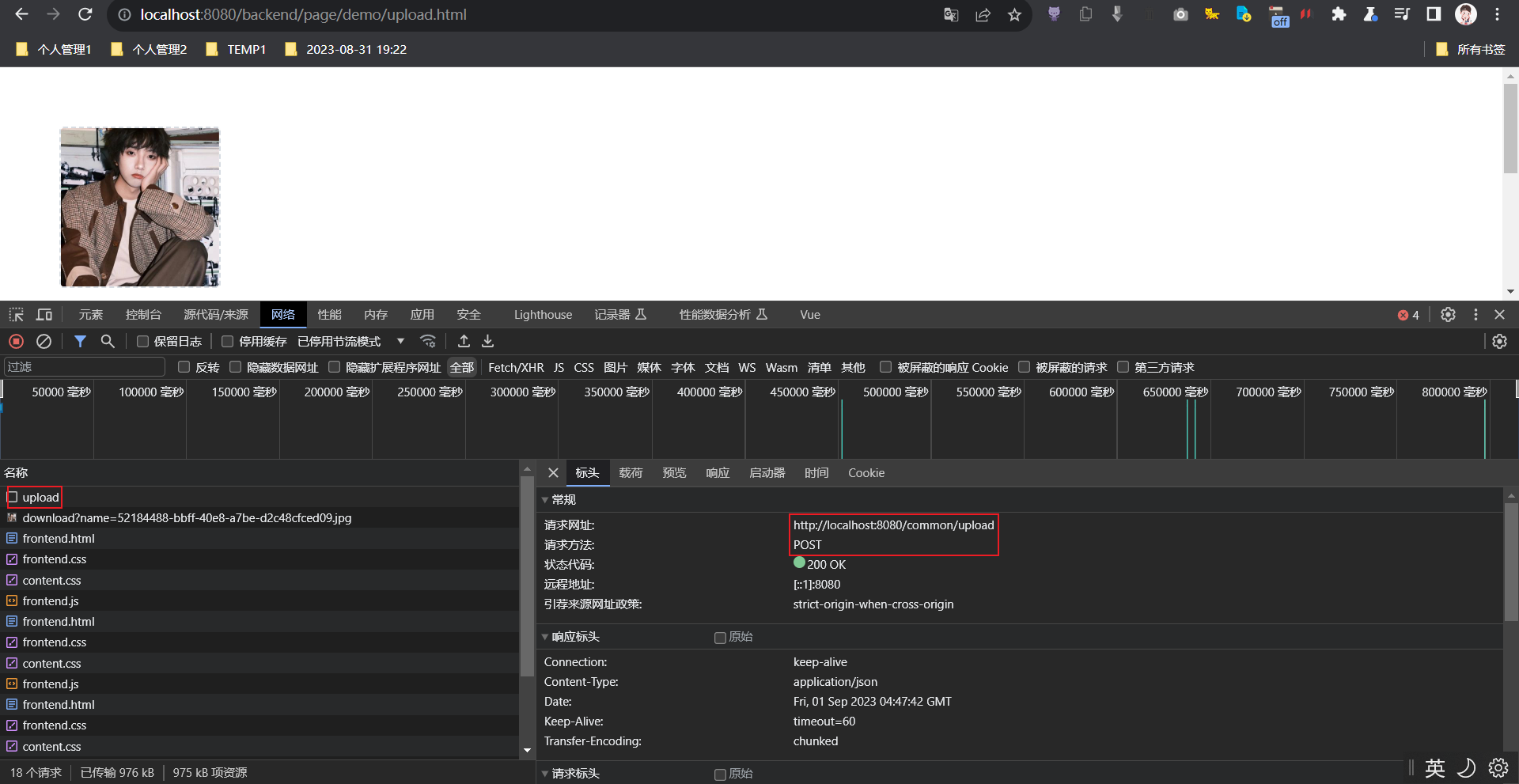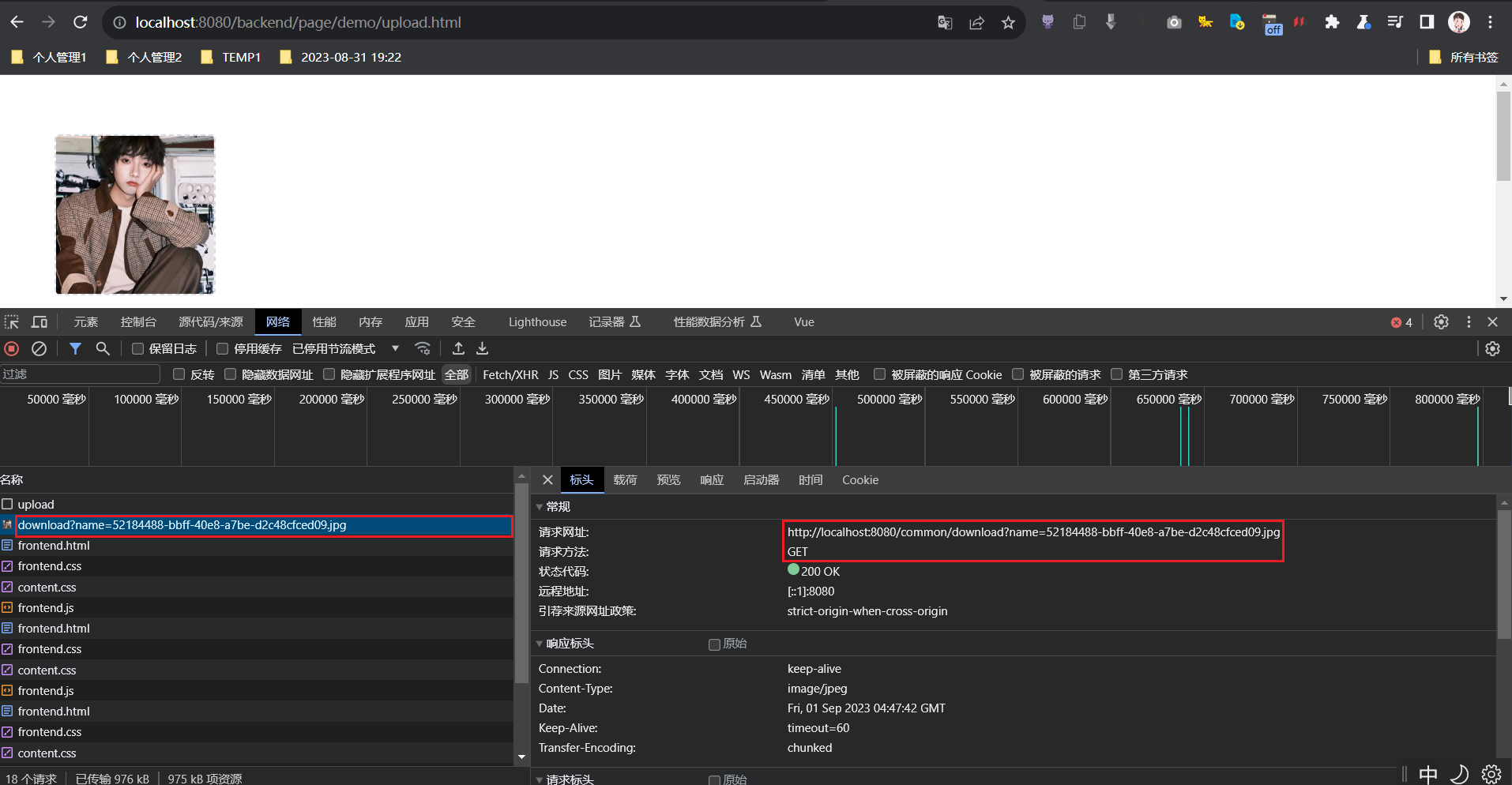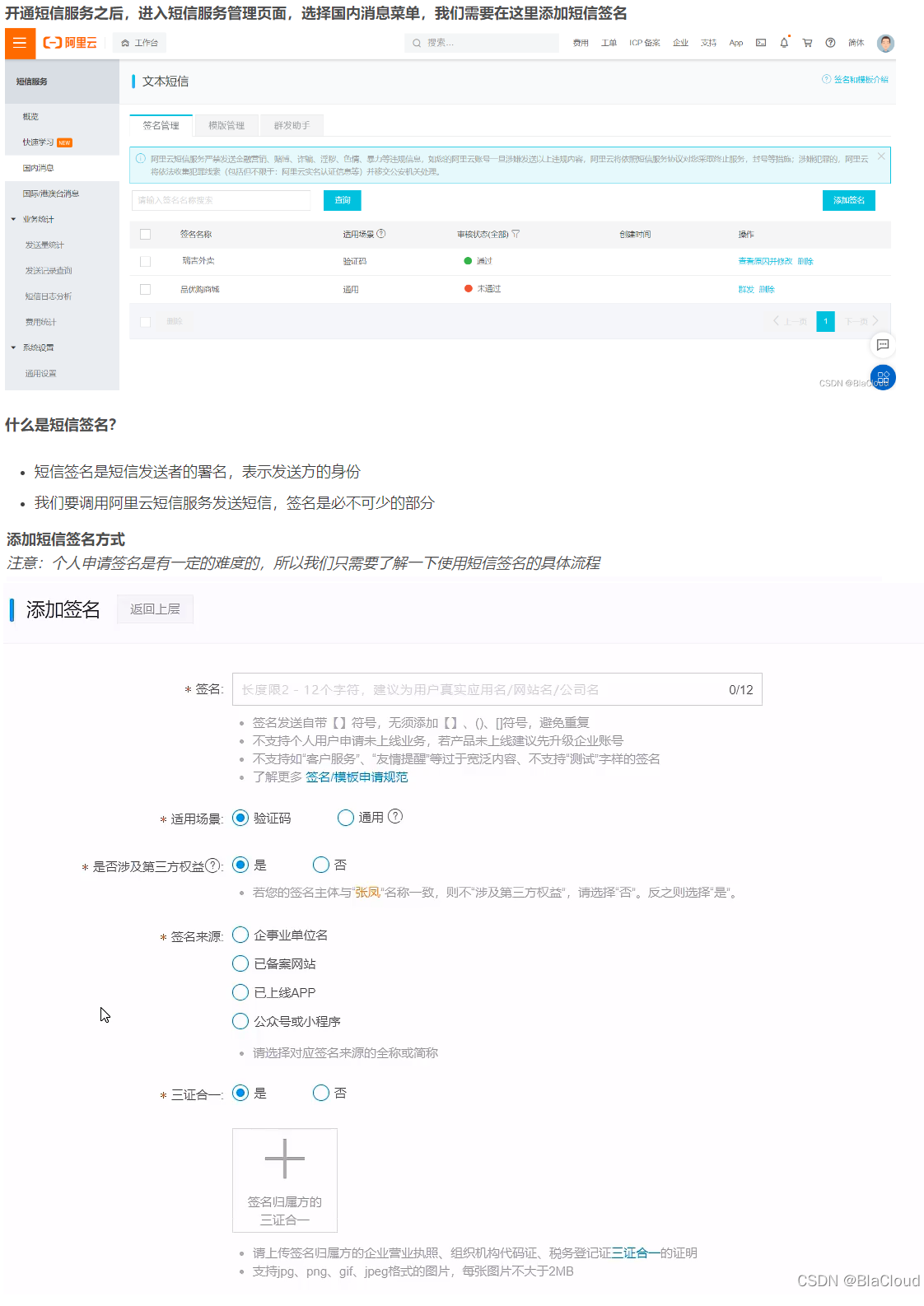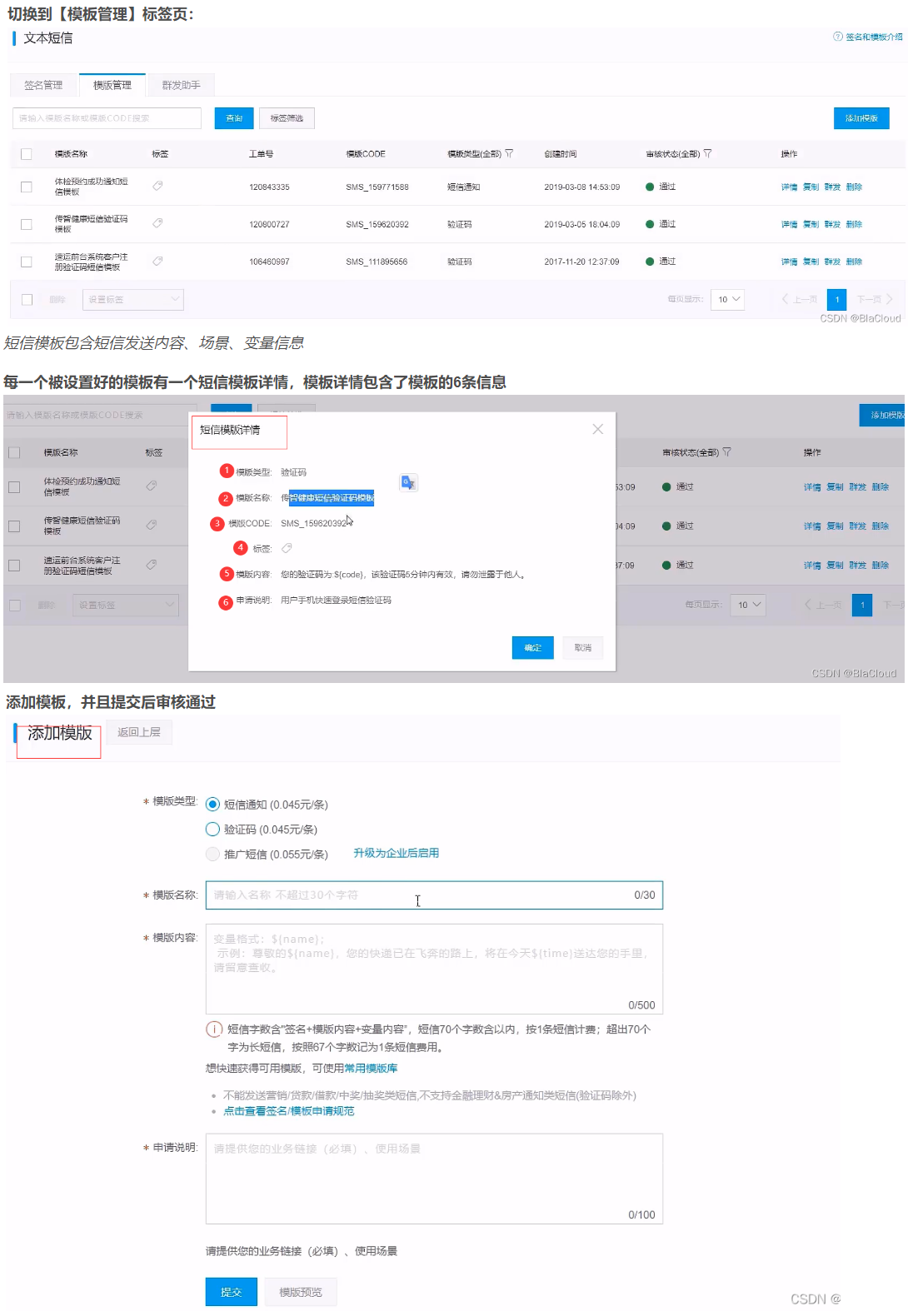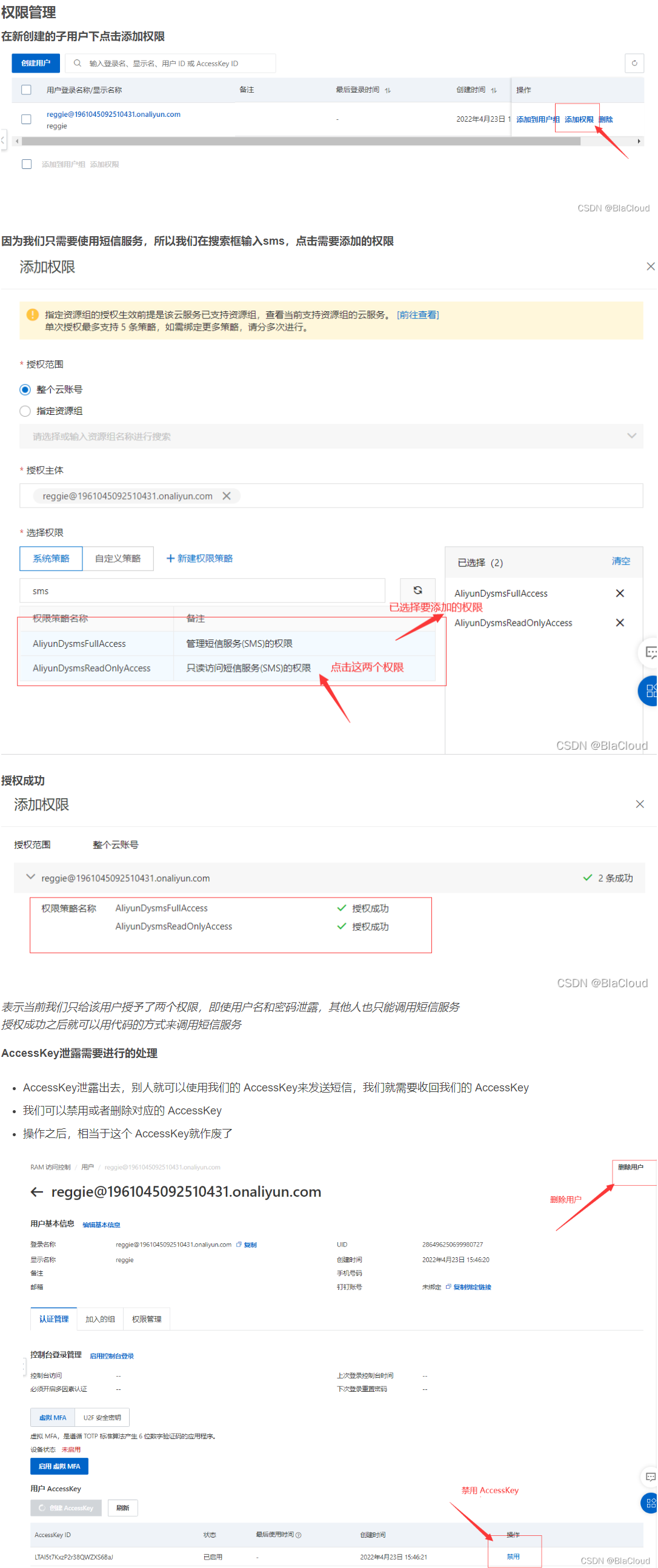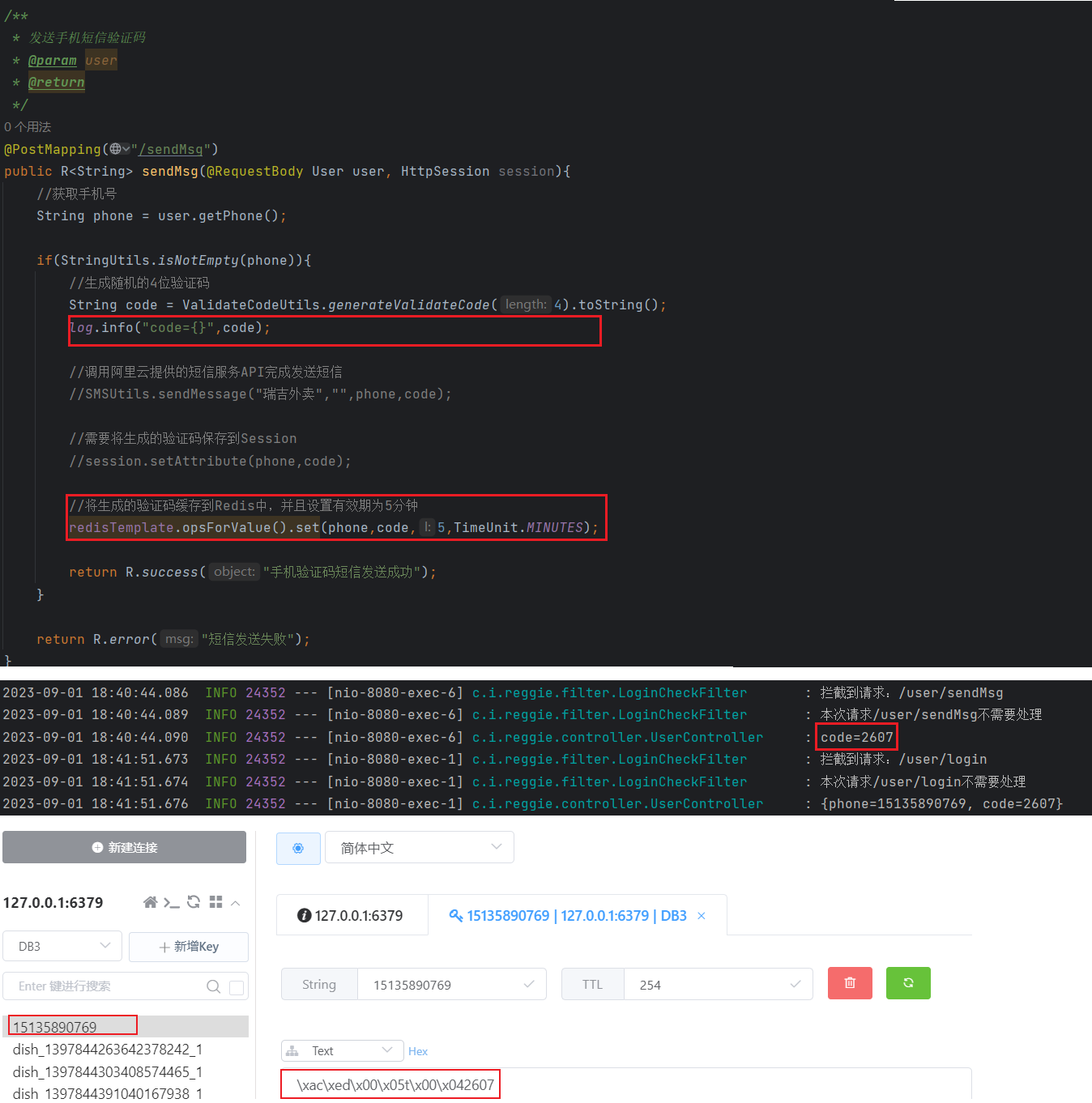1 项目简介
1.1 介绍
| 名称 | 说明
|--------|-------------------------------------------------------
| Entity | 实体,通常和数据库中的表对应
| DTO | 数据传输对象,通常用于程序中各层之间传递数据
| VO | 视图对象,为前端展示数据提供的对象
| POJO | 普通Java对象,只有属性和对应的getter和setter
-------------------------------------------------------------------------------------------------------------
序号 | 名称 | 说明
|----|--------------|--------------------------------------------
| 1 | sky-take-out | maven父工程,统一管理依赖版本,聚合其他子模块
| 2 | sky-common | 子模块,存放公共类,例如:工具类、常量类、异常类等
| 3 | sky-pojo | 子模块,存放实体类、VO、DTO等
| 4 | sky-server | 子模块,后端服务,存放配置文件、Controller、Service、Mapper等
-------------------------------------------------------------------------------------------------------------
本项目约定:
管理端发出的请求,统一使用 /admin 作为前缀
用户端发出的请求,统一使用 /user 作为前缀
-------------------------------------------------------------------------------------------------------------
营业额:已完成订单的总金额
有效订单:已完成订单的数量
订单完成率:有效订单数 / 总订单数 * 100%
平均客单价:营业额 / 有效订单数
新增用户:新增用户的数量
1.2 postman
a.Params
Params:接口显式请求时的参数,会出现在接口地址后,如/doLogin?username=admin&password=123456
Body:接口真正请求时的参数,不会出现在接口地址后
b.Body
a.form-data
multipart/form-data:将表单的数据处理为一条消息;由于boundary隔离,因此即可以上传键值对,也可上传多个文件
当上传的字段是文件时,需要通过指定Content-Type(文件类型)、Content-Disposition(字段信息)
SpringMVC使用MultipartHttpServletRequest根据KEY获取对应的VALUE,也可通过MulTipartFile数组接收多个文件
b.x-www-form-urlencoded
x-www-form-urlencoded:将表单内的数据转换为&分隔的键值对;只可以上传键值对
将表单数据编码为name1=value1&name2=value2…,然后把这个字符串接到URL后面的?,封装到http的body中,发出请求
c.raw
raw:Text、JavaScript、JSON、HTML、XML
c.Authorization
Inherit auth from parent No Auth API Key Bearer Token
Basic Auth Digest Auth OAuth 1.0 OAuth 2.0
d.Headers
a.说明
no-cache,并不是代表无缓存,而是指指使用缓存一定要先经过验证
b.Request
Cache-Control: no-cache, 表示浏览器通知服务器,本地没有缓存数据,需要重新获取请求,其作用类似于no-store
c.Response
Cache-Control: max-age=8888,代表本地通知浏览器,8888秒之内别来烦我,而是自己从缓冲区中刷新
1.3 封装结果:Result
/**
* 后端统一返回结果
* @param <T>
*/
@Data
public class Result<T> implements Serializable {
private Integer code; //编码:1成功,0和其它数字为失败
private String msg; //错误信息
private T data; //数据
public static <T> Result<T> success() {
Result<T> result = new Result<T>();
result.code = 1;
return result;
}
public static <T> Result<T> success(T object) {
Result<T> result = new Result<T>();
result.data = object;
result.code = 1;
return result;
}
public static <T> Result<T> error(String msg) {
Result result = new Result();
result.msg = msg;
result.code = 0;
return result;
}
}
2 表设计
2.1 employee:员工
2.2 category:菜品及套餐分类
2.3 dish:菜品
2.4 dish_flavor:菜品口味关系表
2.5 setmeal:套餐
2.6 setmeal_dish:套餐菜品关系
2.7 user:用户表
2.9 orders:订单表
2.10 order_detail:订单明细表
2.11 address_book:地址簿
3 员工ID:ThreadLocal
3.1 BaseContext
ThreadLocal并不是一个Thread,而是Thread的局部变量。
ThreadLocal为每个线程提供单独一份存储空间,具有线程隔离的效果,只有在线程内才能获取到对应的值,线程外则不能访问。
-------------------------------------------------------------------------------------------------------------
public class BaseContext {
public static ThreadLocal<Long> threadLocal = new ThreadLocal<>();
public static void setCurrentId(Long id) {
threadLocal.set(id);
}
public static Long getCurrentId() {
return threadLocal.get();
}
public static void removeCurrentId() {
threadLocal.remove();
}
}
3.2 BaseContext.setCurrentId()
@Component
@Slf4j
public class JwtTokenAdminInterceptor implements HandlerInterceptor {
@Autowired
private JwtProperties jwtProperties;
/**
* 校验jwt
*
* @param request
* @param response
* @param handler
* @return
* @throws Exception
*/
@Override
public boolean preHandle(HttpServletRequest request, HttpServletResponse response, Object handler) throws Exception {
//判断当前拦截到的是Controller的方法还是其他资源
if (!(handler instanceof HandlerMethod)) {
//当前拦截到的不是动态方法, 直接放行
return true;
}
//1、从请求头中获取令牌
String token = request.getHeader(jwtProperties.getAdminTokenName());
//2、校验令牌
try {
log.info("jwt校验:{}", token);
Claims claims = JwtUtil.parseJWT(jwtProperties.getAdminSecretKey(), token);
Long empId = Long.valueOf(claims.get(JwtClaimsConstant.EMP_ID).toString());
log.info("当前员工id:", empId);
BaseContext.setCurrentId(empId); //线程ID
//3、通过,放行
return true;
} catch (Exception ex) {
//4、不通过,响应401状态码
response.setStatus(401);
return false;
}
}
}
3.3 BaseContext.getCurrentId()
@Service
public class EmployeeServiceImpl implements EmployeeService {
/**
* 新增员工
* @param employeeDTO
*/
@Override
public void insert(EmployeeDTO employeeDTO) {
Employee employee = new Employee();
//对象属性拷贝
BeanUtils.copyProperties(employeeDTO, employee);
//设置账号的状态,默认正常状态 1表示正常 0表示锁定
employee.setStatus(StatusConstant.ENABLE);
//设置密码,默认密码123456
employee.setPassword(DigestUtils.md5DigestAsHex(PasswordConstant.DEFAULT_PASSWORD.getBytes()));
//设置当前记录的创建时间和修改时间
// employee.setCreateTime(LocalDateTime.now());
// employee.setUpdateTime(LocalDateTime.now());
//设置当前记录创建人id和修改人id
// employee.setCreateUser(BaseContext.getCurrentId());
// employee.setUpdateUser(BaseContext.getCurrentId());
employeeMapper.insert(employee);
}
}
4 WebMVC配置类
4.1 通过knife4j生成接口文档
<!-- Spring Boot单服务架构使用最新版的knife4j依赖,已经继承swagger依赖,同时增强UI实现 -->
<dependency>
<groupId>com.github.xiaoymin</groupId>
<artifactId>knife4j-spring-boot-starter</artifactId>
<version>2.0.7</version>
</dependency>
-------------------------------------------------------------------------------------------------------------
@Configuration
@Slf4j
public class WebMvcConfiguration extends WebMvcConfigurationSupport {
/**
* 通过knife4j生成接口文档
* @return
*/
@Bean
public Docket docket() {
ApiInfo apiInfo = new ApiInfoBuilder()
.title("苍穹外卖项目接口文档")
.version("2.0")
.description("苍穹外卖项目接口文档")
.build();
Docket docket = new Docket(DocumentationType.SWAGGER_2)
.apiInfo(apiInfo)
.select()
.apis(RequestHandlerSelectors.basePackage("com.sky.controller"))
.paths(PathSelectors.any())
.build();
return docket;
}
}
4.2 设置静态资源映射
@Configuration
@Slf4j
public class WebMvcConfiguration extends WebMvcConfigurationSupport {
@Override
protected void addResourceHandlers(ResourceHandlerRegistry registry) {
registry.addResourceHandler("/doc.html").addResourceLocations("classpath:/META-INF/resources/");
registry.addResourceHandler("/webjars/**").addResourceLocations("classpath:/META-INF/resources/webjars/");
}
}
4.3.1 分析
1.提供对象转换器Jackson0bjectMapper,基于Jackson进行Java对象到json数据的转换
2.在WebMcConfig配置类中扩展Spring mvc的消息转换器,在此消息转换器中使用提供的对象转换器进行Java对象到json数据的转换
4.3.2 对象映射器
/**
* 对象映射器:基于jackson将Java对象转为json,或者将json转为Java对象
* 将JSON解析为Java对象的过程称为 [从JSON反序列化Java对象]
* 从Java对象生成JSON的过程称为 [序列化Java对象到JSON]
*/
public class JacksonObjectMapper extends ObjectMapper {
public static final String DEFAULT_DATE_FORMAT = "yyyy-MM-dd";
//public static final String DEFAULT_DATE_TIME_FORMAT = "yyyy-MM-dd HH:mm:ss";
public static final String DEFAULT_DATE_TIME_FORMAT = "yyyy-MM-dd HH:mm";
public static final String DEFAULT_TIME_FORMAT = "HH:mm:ss";
public JacksonObjectMapper() {
super();
//收到未知属性时不报异常
this.configure(FAIL_ON_UNKNOWN_PROPERTIES, false);
//反序列化时,属性不存在的兼容处理
this.getDeserializationConfig().withoutFeatures(DeserializationFeature.FAIL_ON_UNKNOWN_PROPERTIES);
SimpleModule simpleModule = new SimpleModule()
.addDeserializer(LocalDateTime.class, new LocalDateTimeDeserializer(DateTimeFormatter.ofPattern(DEFAULT_DATE_TIME_FORMAT)))
.addDeserializer(LocalDate.class, new LocalDateDeserializer(DateTimeFormatter.ofPattern(DEFAULT_DATE_FORMAT)))
.addDeserializer(LocalTime.class, new LocalTimeDeserializer(DateTimeFormatter.ofPattern(DEFAULT_TIME_FORMAT)))
.addSerializer(LocalDateTime.class, new LocalDateTimeSerializer(DateTimeFormatter.ofPattern(DEFAULT_DATE_TIME_FORMAT)))
.addSerializer(LocalDate.class, new LocalDateSerializer(DateTimeFormatter.ofPattern(DEFAULT_DATE_FORMAT)))
.addSerializer(LocalTime.class, new LocalTimeSerializer(DateTimeFormatter.ofPattern(DEFAULT_TIME_FORMAT)));
//注册功能模块 例如,可以添加自定义序列化器和反序列化器
this.registerModule(simpleModule);
}
}
4.3.3 扩展消息转换器
@Configuration
@Slf4j
public class WebMvcConfiguration extends WebMvcConfigurationSupport {
@Override
protected void extendMessageConverters(List<HttpMessageConverter<?>> converters) {
log.info("扩展消息转换器...");
//创建一个消息转换器对象
MappingJackson2HttpMessageConverter converter = new MappingJackson2HttpMessageConverter();
//需要为消息转换器设置一个对象转换器,对象转换器可以将Java对象序列化为json数据
converter.setObjectMapper(new JacksonObjectMapper());
//将自己的消息转化器加入容器中
converters.add(0,converter);
}
}
4.4 拦截器:校验jwt
4.4.1 依赖
<dependency>
<groupId>io.jsonwebtoken</groupId>
<artifactId>jjwt</artifactId>
<version>0.9.1</version>
</dependency>
4.4.2 配置文件
sky:
jwt:
# 管理端
admin-secret-key: itcast
admin-ttl: 7200000000000
admin-token-name: token
4.4.3 批量注值
@Component
@ConfigurationProperties(prefix = "sky.jwt")
@Data
public class JwtProperties {
/**
* 管理端员工生成jwt令牌相关配置
*/
private String adminSecretKey;
private long adminTtl;
private String adminTokenName;
/**
* 用户端微信用户生成jwt令牌相关配置
*/
private String userSecretKey;
private long userTtl;
private String userTokenName;
}
4.4.4 工具类
public class JwtUtil {
/**
* 生成jwt
* 使用Hs256算法, 私匙使用固定秘钥
*
* @param secretKey jwt秘钥
* @param ttlMillis jwt过期时间(毫秒)
* @param claims 设置的信息
* @return
*/
public static String createJWT(String secretKey, long ttlMillis, Map<String, Object> claims) {
// 指定签名的时候使用的签名算法,也就是header那部分
SignatureAlgorithm signatureAlgorithm = SignatureAlgorithm.HS256;
// 生成JWT的时间
long expMillis = System.currentTimeMillis() + ttlMillis;
Date exp = new Date(expMillis);
// 设置jwt的body
JwtBuilder builder = Jwts.builder()
// 如果有私有声明,一定要先设置这个自己创建的私有的声明,这个是给builder的claim赋值,一旦写在标准的声明赋值之后,就是覆盖了那些标准的声明的
.setClaims(claims)
// 设置签名使用的签名算法和签名使用的秘钥
.signWith(signatureAlgorithm, secretKey.getBytes(StandardCharsets.UTF_8))
// 设置过期时间
.setExpiration(exp);
return builder.compact();
}
/**
* Token解密
*
* @param secretKey jwt秘钥 此秘钥一定要保留好在服务端, 不能暴露出去, 否则sign就可以被伪造, 如果对接多个客户端建议改造成多个
* @param token 加密后的token
* @return
*/
public static Claims parseJWT(String secretKey, String token) {
// 得到DefaultJwtParser
Claims claims = Jwts.parser()
// 设置签名的秘钥
.setSigningKey(secretKey.getBytes(StandardCharsets.UTF_8))
// 设置需要解析的jwt
.parseClaimsJws(token).getBody();
return claims;
}
}
4.4.5 jwt令牌校验的拦截器
@Component
@Slf4j
public class JwtTokenAdminInterceptor implements HandlerInterceptor {
@Autowired
private JwtProperties jwtProperties;
/**
* 校验jwt
*
* @param request
* @param response
* @param handler
* @return
* @throws Exception
*/
@Override
public boolean preHandle(HttpServletRequest request, HttpServletResponse response, Object handler) throws Exception {
//判断当前拦截到的是Controller的方法还是其他资源
if (!(handler instanceof HandlerMethod)) {
//当前拦截到的不是动态方法, 直接放行
return true;
}
//1、从请求头中获取令牌
String token = request.getHeader(jwtProperties.getAdminTokenName());
//2、校验令牌
try {
log.info("jwt校验:{}", token);
Claims claims = JwtUtil.parseJWT(jwtProperties.getAdminSecretKey(), token);
Long empId = Long.valueOf(claims.get(JwtClaimsConstant.EMP_ID).toString());
log.info("当前员工id:", empId);
BaseContext.setCurrentId(empId); //线程ID
//3、通过,放行
return true;
} catch (Exception ex) {
//4、不通过,响应401状态码
response.setStatus(401);
return false;
}
}
}
4.4.6 注册自定义拦截器
@Configuration
@Slf4j
public class WebMvcConfiguration extends WebMvcConfigurationSupport {
@Autowired
private JwtTokenAdminInterceptor jwtTokenAdminInterceptor;
/**
* 注册自定义拦截器
*
* @param registry
*/
@Override
protected void addInterceptors(InterceptorRegistry registry) {
log.info("开始注册自定义拦截器...");
registry.addInterceptor(jwtTokenAdminInterceptor)
.addPathPatterns("/admin/**")
.excludePathPatterns("/admin/employee/login");
}
}
4.4.7 测试:实体类
@Data
@ApiModel(description = "员工登录时传递的数据模型")
public class EmployeeLoginDTO implements Serializable {
@ApiModelProperty("用户名")
private String username;
@ApiModelProperty("密码")
private String password;
}
-------------------------------------------------------------------------------------------------------------
@Data
@Builder
@NoArgsConstructor
@AllArgsConstructor
@ApiModel(description = "员工登录返回的数据格式")
public class EmployeeLoginVO implements Serializable {
@ApiModelProperty("主键值")
private Long id;
@ApiModelProperty("用户名")
private String userName;
@ApiModelProperty("姓名")
private String name;
@ApiModelProperty("jwt令牌")
private String token;
}
4.4.8 测试:Controller层
@RestController
@RequestMapping("/admin/employee")
@Slf4j
@Api(tags = "员工相关接口")
public class EmployeeController {
@Autowired
private EmployeeService employeeService;
@Autowired
private JwtProperties jwtProperties;
/**
* 登录
* @param employeeLoginDTO
* @return
*/
@ApiOperation(value = "员工登录")
@PostMapping("/login")
public Result<EmployeeLoginVO> login(@RequestBody EmployeeLoginDTO employeeLoginDTO) {
log.info("员工登录:{}", employeeLoginDTO);
Employee employee = employeeService.login(employeeLoginDTO);
//登录成功后,生成jwt令牌
Map<String, Object> claims = new HashMap<>();
claims.put(JwtClaimsConstant.EMP_ID, employee.getId());
String token = JwtUtil.createJWT(
jwtProperties.getAdminSecretKey(),
jwtProperties.getAdminTtl(),
claims);
EmployeeLoginVO employeeLoginVO = EmployeeLoginVO.builder()
.id(employee.getId())
.userName(employee.getUsername())
.name(employee.getName())
.token(token)
.build();
return Result.success(employeeLoginVO);
}
}
4.4.9 测试:Service层
@Service
public class EmployeeServiceImpl implements EmployeeService {
@Autowired
private EmployeeMapper employeeMapper;
/**
* 员工登录
* @param employeeLoginDTO
* @return
*/
public Employee login(EmployeeLoginDTO employeeLoginDTO) {
String username = employeeLoginDTO.getUsername();
String password = employeeLoginDTO.getPassword();
//1、根据用户名查询数据库中的数据
Employee employee = employeeMapper.getByUsername(username);
//2、处理各种异常情况(用户名不存在、密码不对、账号被锁定)
if (employee == null) {
//账号不存在
throw new AccountNotFoundException(MessageConstant.ACCOUNT_NOT_FOUND);
}
//密码比对
password = DigestUtils.md5DigestAsHex(password.getBytes());
if (!password.equals(employee.getPassword())) {
//密码错误
throw new PasswordErrorException(MessageConstant.PASSWORD_ERROR);
}
if (employee.getStatus() == StatusConstant.DISABLE) {
//账号被锁定
throw new AccountLockedException(MessageConstant.ACCOUNT_LOCKED);
}
//3、返回实体对象
return employee;
}
}
5 公共字段自动填充:切面编程
5.1 自定义注解:@AutoFill
@Target(ElementType.METHOD)
@Retention(RetentionPolicy.RUNTIME)
public @interface AutoFill {
//数据库操作类型:UPDATE INSERT
OperationType value();
}
5.2 枚举:OperationType
public enum OperationType {
/**
* 更新操作
*/
UPDATE,
/**
* 插入操作
*/
INSERT
}
5.3 自定义切面:AutoFillAspect
@Aspect
@Component
@Slf4j
public class AutoFillAspect {
/**
* 切入点
*/
@Pointcut("execution(* com.sky.mapper.*.*(..)) && @annotation(com.sky.annotation.AutoFill)")
public void autoFillPointCut(){}
/**
* 前置通知,在通知中进行公共字段的赋值
*/
@Before("autoFillPointCut()")
public void autoFill(JoinPoint joinPoint){
log.info("开始进行公共字段自动填充...");
//获取到当前被拦截的方法上的数据库操作类型
MethodSignature signature = (MethodSignature) joinPoint.getSignature();//方法签名对象
AutoFill autoFill = signature.getMethod().getAnnotation(AutoFill.class);//获得方法上的注解对象
OperationType operationType = autoFill.value();//获得数据库操作类型
//获取到当前被拦截的方法的参数--实体对象
Object[] args = joinPoint.getArgs();
if(args == null || args.length == 0){
return;
}
Object entity = args[0];
//准备赋值的数据
LocalDateTime now = LocalDateTime.now();
Long currentId = BaseContext.getCurrentId();
//根据当前不同的操作类型,为对应的属性通过反射来赋值
if(operationType == OperationType.INSERT){
//为4个公共字段赋值
try {
Method setCreateTime = entity.getClass().getDeclaredMethod(AutoFillConstant.SET_CREATE_TIME, LocalDateTime.class);
Method setCreateUser = entity.getClass().getDeclaredMethod(AutoFillConstant.SET_CREATE_USER, Long.class);
Method setUpdateTime = entity.getClass().getDeclaredMethod(AutoFillConstant.SET_UPDATE_TIME, LocalDateTime.class);
Method setUpdateUser = entity.getClass().getDeclaredMethod(AutoFillConstant.SET_UPDATE_USER, Long.class);
//通过反射为对象属性赋值
setCreateTime.invoke(entity,now);
setCreateUser.invoke(entity,currentId);
setUpdateTime.invoke(entity,now);
setUpdateUser.invoke(entity,currentId);
} catch (Exception e) {
e.printStackTrace();
}
}else if(operationType == OperationType.UPDATE){
//为2个公共字段赋值
try {
Method setUpdateTime = entity.getClass().getDeclaredMethod(AutoFillConstant.SET_UPDATE_TIME, LocalDateTime.class);
Method setUpdateUser = entity.getClass().getDeclaredMethod(AutoFillConstant.SET_UPDATE_USER, Long.class);
//通过反射为对象属性赋值
setUpdateTime.invoke(entity,now);
setUpdateUser.invoke(entity,currentId);
} catch (Exception e) {
e.printStackTrace();
}
}
}
}
5.4 使用注解:Mapper接口
@Mapper
public interface EmployeeMapper {
/**
* 根据用户名查询员工
* @param username
* @return
*/
Employee getByUsername(String username);
/**
* 新增员工
* @param employee
*/
@AutoFill(value = OperationType.INSERT)
void insert(Employee employee);
/**
* 分页查询
* @param employeePageQueryDTO
* @return
*/
Page<Employee> pageQuery(EmployeePageQueryDTO employeePageQueryDTO);
/**
* 根据主键动态修改属性
* @param employee
*/
@AutoFill(value = OperationType.UPDATE)
void update(Employee employee);
/**
* 根据id查询员工信息
* @param id
* @return
*/
Employee getById(Long id);
}
6 公共字段自动填充:@TableField
6.1 思路
Mybatis Plus公共字段自动填充,也就是在插入或者更新的时候为指定字段赋予指定的值,使用它的好处就是可以统一对这些字段进行处理,避免了重复代码。
实现步骤:
在实体类的属性上加入@TableField注解,指定自动填充的策略
按照框架要求编写元数据对象处理器,在此类中统一为公共字段赋值,此类需要实现MetaObjectHandler接口
-------------------------------------------------------------------------------------------------------------
客户端发送的每次http请求,对应的在服务端都会分配一个新的线程来处理,在处理过程中涉及到下面类中的方法都属于相同的一个线程:
1.LoginCheckFilter的doFilter方法
2.EmployeeController的update方法
3.MyMetaObjectHandler的updateFill方法
可以在上面的三个方法中分别加入下面代码(获取当前线程id) :
4.long id = Thread.currentThread().getId();
5.log.info(“MyMetaObjectHandler线程id为:{}”,id);
-------------------------------------------------------------------------------------------------------------
什么是ThreadLocal?
ThreadLocal并不是一个Thread,而是Thread的局部变量
当使用ThreadLocal维护变量时,ThreadLocal为每个使用该变量的线程提供独立的变量副本
所以每一个线程都可以独立地改变自己的副本,而不会影响其它线程所对应的副本
ThreadLocal为每个线程提供单独一份存储空间,具有线程隔离的效果,只有在线程内才能获取到对应的值,线程外则不能访问。
ThreadLocal常用方法:
public void set(T value) 设置当前线程的线程局部变量的值
public T get() 返回当前线程所对应的线程局部变量的值
6.2 在公共属性上添加@TableField注解
/**
* 员工实体
*/
@Data
public class Employee implements Serializable {
private static final long serialVersionUID = 1L;
private Long id;
private String username;
private String name;
private String password;
private String phone;
private String sex;
private String idNumber;//身份证号码
private Integer status;
@TableField(fill = FieldFill.INSERT) //插入时填充字段
private LocalDateTime createTime;
@TableField(fill = FieldFill.INSERT_UPDATE) //插入和更新时填充字段
private LocalDateTime updateTime;
@TableField(fill = FieldFill.INSERT) //插入时填充字段
private Long createUser;
@TableField(fill = FieldFill.INSERT_UPDATE) //插入和更新时填充字段
private Long updateUser;
}
@Component
@Slf4j
public class MyMetaObjecthandler implements MetaObjectHandler {
/**
* 插入操作,自动填充
* @param metaObject
*/
@Override
public void insertFill(MetaObject metaObject) {
log.info("公共字段自动填充[insert]...");
log.info(metaObject.toString());
metaObject.setValue("createTime", LocalDateTime.now());
metaObject.setValue("updateTime",LocalDateTime.now());
metaObject.setValue("createUser",BaseContext.getCurrentId());
metaObject.setValue("updateUser",BaseContext.getCurrentId());
}
/**
* 更新操作,自动填充
* @param metaObject
*/
@Override
public void updateFill(MetaObject metaObject) {
log.info("公共字段自动填充[update]...");
log.info(metaObject.toString());
long id = Thread.currentThread().getId();
log.info("线程id为:{}",id);
metaObject.setValue("updateTime",LocalDateTime.now());
metaObject.setValue("updateUser",BaseContext.getCurrentId());
}
}
7 图片上传:阿里云OSS
7.1 依赖
<dependency>
<groupId>com.aliyun.oss</groupId>
<artifactId>aliyun-sdk-oss</artifactId>
<version>3.10.2</version>
</dependency>
7.2 配置文件
sky:
alioss:
endpoint: oss-cn-beijing.aliyuncs.com
bucket-name: sky-take-out-refer
7.3 批量注值
@Component
@ConfigurationProperties(prefix = "sky.alioss")
@Data
public class AliOssProperties {
private String endpoint;
private String accessKeyId;
private String accessKeySecret;
private String bucketName;
}
7.4 工具类
@Data
@AllArgsConstructor
@Slf4j
public class AliOssUtil {
private String endpoint;
private String accessKeyId;
private String accessKeySecret;
private String bucketName;
/**
* 文件上传
*
* @param bytes
* @param objectName
* @return
*/
public String upload(byte[] bytes, String objectName) {
// 创建OSSClient实例。
OSS ossClient = new OSSClientBuilder().build(endpoint, accessKeyId, accessKeySecret);
try {
// 创建PutObject请求。
ossClient.putObject(bucketName, objectName, new ByteArrayInputStream(bytes));
} catch (OSSException oe) {
System.out.println("Caught an OSSException, which means your request made it to OSS, "
+ "but was rejected with an error response for some reason.");
System.out.println("Error Message:" + oe.getErrorMessage());
System.out.println("Error Code:" + oe.getErrorCode());
System.out.println("Request ID:" + oe.getRequestId());
System.out.println("Host ID:" + oe.getHostId());
} catch (ClientException ce) {
System.out.println("Caught an ClientException, which means the client encountered "
+ "a serious internal problem while trying to communicate with OSS, "
+ "such as not being able to access the network.");
System.out.println("Error Message:" + ce.getMessage());
} finally {
if (ossClient != null) {
ossClient.shutdown();
}
}
//文件访问路径规则 https://BucketName.Endpoint/ObjectName
StringBuilder stringBuilder = new StringBuilder("https://");
stringBuilder
.append(bucketName)
.append(".")
.append(endpoint)
.append("/")
.append(objectName);
log.info("文件上传到:{}", stringBuilder.toString());
return stringBuilder.toString();
}
}
7.5 注入IOC容器
@Configuration
@Slf4j
public class OssConfiguration {
@Bean
@ConditionalOnMissingBean
public AliOssUtil aliOssUtil(AliOssProperties aliOssProperties){
log.info("开始创建阿里云文件上传工具类对象:{}",aliOssProperties);
return new AliOssUtil(aliOssProperties.getEndpoint(),
aliOssProperties.getAccessKeyId(),
aliOssProperties.getAccessKeySecret(),
aliOssProperties.getBucketName());
}
}
7.6 测试:控制台
2023-08-23 17:56:59.826 INFO 6204 --- [ main] com.sky.config.OssConfiguration : 开始创建阿里云文件上传工具类对象:AliOssProperties(endpoint=oss-cn-beijing.aliyuncs.com, bucketName=sky-take-out-refer)
2023-08-23 17:57:00.140 INFO 6204 --- [ main] com.sky.config.WebMvcConfiguration : 开始注册自定义拦截器...
2023-08-23 17:57:00.305 INFO 6204 --- [ main] com.sky.config.WebMvcConfiguration : 扩展消息转换器...
返回oss路径:
https://sky-take-out-refer.oss-cn-beijing.aliyuncs.com/be79e262-f8b3-4bcf-bb19-22690991ee8a.jpg
7.7 测试:Controller层
@RestController
@RequestMapping("/admin/common")
@Api(tags = "通用接口")
@Slf4j
public class CommonController {
@Autowired
private AliOssUtil aliOssUtil;
/**
* 文件上传
* @param file
* @return
*/
@PostMapping("/upload")
@ApiOperation("文件上传")
public Result<String> upload(MultipartFile file){
log.info("文件上传:{}",file);
try {
//原始文件名
String originalFilename = file.getOriginalFilename();
//截取原始文件名的后缀 dfdfdf.png
String extension = originalFilename.substring(originalFilename.lastIndexOf("."));
//构造新文件名称
String objectName = UUID.randomUUID().toString() + extension;
//文件的请求路径
String filePath = aliOssUtil.upload(file.getBytes(), objectName);
return Result.success(filePath);
} catch (IOException e) {
log.error("文件上传失败:{}", e);
}
return Result.error(MessageConstant.UPLOAD_FAILED);
}
}
8 RedisTemplate
8.1 依赖
<dependency>
<groupId>org.springframework.boot</groupId>
<artifactId>spring-boot-starter-data-redis</artifactId>
</dependency>
8.2 配置文件
spring:
redis:
host: localhost
port: 6379
password: myslayers
database: 0
8.3 注入IOC容器
@Configuration
@Slf4j
public class RedisConfiguration {
@Bean
public RedisTemplate redisTemplate(RedisConnectionFactory redisConnectionFactory){
log.info("开始创建redis模板对象...");
RedisTemplate redisTemplate = new RedisTemplate();
//设置redis的连接工厂对象
redisTemplate.setConnectionFactory(redisConnectionFactory);
//设置redis key的序列化器
redisTemplate.setKeySerializer(new StringRedisSerializer());
return redisTemplate;
}
}
8.4 测试:控制台
2023-08-25 22:12:41.862 INFO 35852 --- [ main] com.sky.config.OssConfiguration : 开始创建阿里云文件上传工具类对象:AliOssProperties(endpoint=oss-cn-beijing.aliyuncs.com, bucketName=sky-take-out-refer)
2023-08-25 22:12:42.223 INFO 35852 --- [ main] com.sky.config.RedisConfiguration : 开始创建redis模板对象...
2023-08-25 22:12:42.668 INFO 35852 --- [ main] com.sky.config.WebMvcConfiguration : 开始注册自定义拦截器...
2023-08-25 22:12:42.850 INFO 35852 --- [ main] com.sky.config.WebMvcConfiguration : 扩展消息转换器...
8.5 测试类
@SpringBootTest
public class SpringDataRedisTest {
@Autowired
private RedisTemplate redisTemplate;
@Test
public void testRedisTemplate() {
System.out.println(redisTemplate);
ValueOperations valueOperations = redisTemplate.opsForValue();
HashOperations hashOperations = redisTemplate.opsForHash();
ListOperations listOperations = redisTemplate.opsForList();
SetOperations setOperations = redisTemplate.opsForSet();
ZSetOperations zSetOperations = redisTemplate.opsForZSet();
}
/**
* 通用命令操作
*/
@Test
public void testCommon() {
//keys exists type del
Set keys = redisTemplate.keys("*");
System.out.println(keys);
Boolean name = redisTemplate.hasKey("name");
Boolean set1 = redisTemplate.hasKey("set1");
for (Object key : keys) {
DataType type = redisTemplate.type(key);
System.out.println(type.name());
}
redisTemplate.delete("mylist");
}
/**
* 操作字符串类型的数据
*/
@Test
public void testString() {
// set get setex setnx
redisTemplate.opsForValue().set("name", "小明");
String city = (String) redisTemplate.opsForValue().get("name");
System.out.println(city);
redisTemplate.opsForValue().set("code", "1234", 3, TimeUnit.MINUTES);
redisTemplate.opsForValue().setIfAbsent("lock", "1");
redisTemplate.opsForValue().setIfAbsent("lock", "2");
}
/**
* 操作列表类型的数据
*/
@Test
public void testList() {
//lpush lrange rpop llen
ListOperations listOperations = redisTemplate.opsForList();
listOperations.leftPushAll("mylist", "a", "b", "c");
listOperations.leftPush("mylist", "d");
List mylist = listOperations.range("mylist", 0, -1);
System.out.println(mylist);
listOperations.rightPop("mylist");
Long size = listOperations.size("mylist");
System.out.println(size);
}
/**
* 操作集合类型的数据
*/
@Test
public void testSet() {
//sadd smembers scard sinter sunion srem
SetOperations setOperations = redisTemplate.opsForSet();
setOperations.add("set1", "a", "b", "c", "d");
setOperations.add("set2", "a", "b", "x", "y");
Set members = setOperations.members("set1");
System.out.println(members);
Long size = setOperations.size("set1");
System.out.println(size);
Set intersect = setOperations.intersect("set1", "set2");
System.out.println(intersect);
Set union = setOperations.union("set1", "set2");
System.out.println(union);
setOperations.remove("set1", "a", "b");
}
/**
* 操作有序集合类型的数据
*/
@Test
public void testZset() {
//zadd zrange zincrby zrem
ZSetOperations zSetOperations = redisTemplate.opsForZSet();
zSetOperations.add("zset1", "a", 10);
zSetOperations.add("zset1", "b", 12);
zSetOperations.add("zset1", "c", 9);
Set zset1 = zSetOperations.range("zset1", 0, -1);
System.out.println(zset1);
zSetOperations.incrementScore("zset1", "c", 10);
zSetOperations.remove("zset1", "a", "b");
}
/**
* 操作哈希类型的数据
*/
@Test
public void testHash() {
//hset hget hdel hkeys hvals
HashOperations hashOperations = redisTemplate.opsForHash();
hashOperations.put("100", "name", "tom");
hashOperations.put("100", "age", "20");
String name = (String) hashOperations.get("100", "name");
System.out.println(name);
Set keys = hashOperations.keys("100");
System.out.println(keys);
List values = hashOperations.values("100");
System.out.println(values);
hashOperations.delete("100", "age");
}
}
9 HttpClient
9.1 场景
微信服务
地图服务
短信服务
天气预报服务
9.2 依赖
<dependency>
<groupId>org.apache.httpcomponents</groupId>
<artifactId>httpclient</artifactId>
</dependency>
9.3 工具类
/**
* Http工具类
*/
public class HttpClientUtil {
static final int TIMEOUT_MSEC = 5 * 1000;
/**
* 发送GET方式请求
* @param url
* @param paramMap
* @return
*/
public static String doGet(String url,Map<String,String> paramMap){
// 创建Httpclient对象
CloseableHttpClient httpClient = HttpClients.createDefault();
String result = "";
CloseableHttpResponse response = null;
try{
URIBuilder builder = new URIBuilder(url);
if(paramMap != null){
for (String key : paramMap.keySet()) {
builder.addParameter(key,paramMap.get(key));
}
}
URI uri = builder.build();
//创建GET请求
HttpGet httpGet = new HttpGet(uri);
//发送请求
response = httpClient.execute(httpGet);
//判断响应状态
if(response.getStatusLine().getStatusCode() == 200){
result = EntityUtils.toString(response.getEntity(),"UTF-8");
}
}catch (Exception e){
e.printStackTrace();
}finally {
try {
response.close();
httpClient.close();
} catch (IOException e) {
e.printStackTrace();
}
}
return result;
}
/**
* 发送POST方式请求
* @param url
* @param paramMap
* @return
* @throws IOException
*/
public static String doPost(String url, Map<String, String> paramMap) throws IOException {
// 创建Httpclient对象
CloseableHttpClient httpClient = HttpClients.createDefault();
CloseableHttpResponse response = null;
String resultString = "";
try {
// 创建Http Post请求
HttpPost httpPost = new HttpPost(url);
// 创建参数列表
if (paramMap != null) {
List<NameValuePair> paramList = new ArrayList();
for (Map.Entry<String, String> param : paramMap.entrySet()) {
paramList.add(new BasicNameValuePair(param.getKey(), param.getValue()));
}
// 模拟表单
UrlEncodedFormEntity entity = new UrlEncodedFormEntity(paramList);
httpPost.setEntity(entity);
}
httpPost.setConfig(builderRequestConfig());
// 执行http请求
response = httpClient.execute(httpPost);
resultString = EntityUtils.toString(response.getEntity(), "UTF-8");
} catch (Exception e) {
throw e;
} finally {
try {
response.close();
} catch (IOException e) {
e.printStackTrace();
}
}
return resultString;
}
/**
* 发送POST方式请求
* @param url
* @param paramMap
* @return
* @throws IOException
*/
public static String doPost4Json(String url, Map<String, String> paramMap) throws IOException {
// 创建Httpclient对象
CloseableHttpClient httpClient = HttpClients.createDefault();
CloseableHttpResponse response = null;
String resultString = "";
try {
// 创建Http Post请求
HttpPost httpPost = new HttpPost(url);
if (paramMap != null) {
//构造json格式数据
JSONObject jsonObject = new JSONObject();
for (Map.Entry<String, String> param : paramMap.entrySet()) {
jsonObject.put(param.getKey(),param.getValue());
}
StringEntity entity = new StringEntity(jsonObject.toString(),"utf-8");
//设置请求编码
entity.setContentEncoding("utf-8");
//设置数据类型
entity.setContentType("application/json");
httpPost.setEntity(entity);
}
httpPost.setConfig(builderRequestConfig());
// 执行http请求
response = httpClient.execute(httpPost);
resultString = EntityUtils.toString(response.getEntity(), "UTF-8");
} catch (Exception e) {
throw e;
} finally {
try {
response.close();
} catch (IOException e) {
e.printStackTrace();
}
}
return resultString;
}
private static RequestConfig builderRequestConfig() {
return RequestConfig.custom()
.setConnectTimeout(TIMEOUT_MSEC)
.setConnectionRequestTimeout(TIMEOUT_MSEC)
.setSocketTimeout(TIMEOUT_MSEC).build();
}
}
9.4 测试类
@SpringBootTest
public class HttpClientTest {
/**
* 测试通过httpclient发送GET方式的请求
*/
@Test
public void testGET() throws Exception{
//创建httpclient对象
CloseableHttpClient httpClient = HttpClients.createDefault();
//创建请求对象
HttpGet httpGet = new HttpGet("http://localhost:8080/user/shop/status");
//发送请求,接受响应结果
CloseableHttpResponse response = httpClient.execute(httpGet);
//获取服务端返回的状态码
int statusCode = response.getStatusLine().getStatusCode();
System.out.println("服务端返回的状态码为:" + statusCode);
HttpEntity entity = response.getEntity();
String body = EntityUtils.toString(entity);
System.out.println("服务端返回的数据为:" + body);
//关闭资源
response.close();
httpClient.close();
}
/**
* 测试通过httpclient发送POST方式的请求
*/
@Test
public void testPOST() throws Exception{
// 创建httpclient对象
CloseableHttpClient httpClient = HttpClients.createDefault();
//创建请求对象
HttpPost httpPost = new HttpPost("http://localhost:8080/admin/employee/login");
JSONObject jsonObject = new JSONObject();
jsonObject.put("username","admin");
jsonObject.put("password","123456");
StringEntity entity = new StringEntity(jsonObject.toString());
//指定请求编码方式
entity.setContentEncoding("utf-8");
//数据格式
entity.setContentType("application/json");
httpPost.setEntity(entity);
//发送请求
CloseableHttpResponse response = httpClient.execute(httpPost);
//解析返回结果
int statusCode = response.getStatusLine().getStatusCode();
System.out.println("响应码为:" + statusCode);
HttpEntity entity1 = response.getEntity();
String body = EntityUtils.toString(entity1);
System.out.println("响应数据为:" + body);
//关闭资源
response.close();
httpClient.close();
}
}
10 微信登录
10.1 拦截器:校验jwt
10.1.1 依赖
<dependency>
<groupId>io.jsonwebtoken</groupId>
<artifactId>jjwt</artifactId>
<version>0.9.1</version>
</dependency>
10.1.2 配置文件
sky:
jwt:
# 用户端
user-secret-key: itheima
user-ttl: 7200000000000
user-token-name: authentication
10.1.3 批量注值
@Component
@ConfigurationProperties(prefix = "sky.jwt")
@Data
public class JwtProperties {
/**
* 管理端员工生成jwt令牌相关配置
*/
private String adminSecretKey;
private long adminTtl;
private String adminTokenName;
/**
* 用户端微信用户生成jwt令牌相关配置
*/
private String userSecretKey;
private long userTtl;
private String userTokenName;
}
10.1.4 工具类
public class JwtUtil {
/**
* 生成jwt
* 使用Hs256算法, 私匙使用固定秘钥
*
* @param secretKey jwt秘钥
* @param ttlMillis jwt过期时间(毫秒)
* @param claims 设置的信息
* @return
*/
public static String createJWT(String secretKey, long ttlMillis, Map<String, Object> claims) {
// 指定签名的时候使用的签名算法,也就是header那部分
SignatureAlgorithm signatureAlgorithm = SignatureAlgorithm.HS256;
// 生成JWT的时间
long expMillis = System.currentTimeMillis() + ttlMillis;
Date exp = new Date(expMillis);
// 设置jwt的body
JwtBuilder builder = Jwts.builder()
// 如果有私有声明,一定要先设置这个自己创建的私有的声明,这个是给builder的claim赋值,一旦写在标准的声明赋值之后,就是覆盖了那些标准的声明的
.setClaims(claims)
// 设置签名使用的签名算法和签名使用的秘钥
.signWith(signatureAlgorithm, secretKey.getBytes(StandardCharsets.UTF_8))
// 设置过期时间
.setExpiration(exp);
return builder.compact();
}
/**
* Token解密
*
* @param secretKey jwt秘钥 此秘钥一定要保留好在服务端, 不能暴露出去, 否则sign就可以被伪造, 如果对接多个客户端建议改造成多个
* @param token 加密后的token
* @return
*/
public static Claims parseJWT(String secretKey, String token) {
// 得到DefaultJwtParser
Claims claims = Jwts.parser()
// 设置签名的秘钥
.setSigningKey(secretKey.getBytes(StandardCharsets.UTF_8))
// 设置需要解析的jwt
.parseClaimsJws(token).getBody();
return claims;
}
}
10.1.5 jwt令牌校验的拦截器
@Component
@Slf4j
public class JwtTokenUserInterceptor implements HandlerInterceptor {
@Autowired
private JwtProperties jwtProperties;
/**
* 校验jwt
*
* @param request
* @param response
* @param handler
* @return
* @throws Exception
*/
@Override
public boolean preHandle(HttpServletRequest request, HttpServletResponse response, Object handler) throws Exception {
//判断当前拦截到的是Controller的方法还是其他资源
if (!(handler instanceof HandlerMethod)) {
//当前拦截到的不是动态方法,直接放行
return true;
}
//1、从请求头中获取令牌
String token = request.getHeader(jwtProperties.getUserTokenName());
//2、校验令牌
try {
log.info("jwt校验:{}", token);
Claims claims = JwtUtil.parseJWT(jwtProperties.getUserSecretKey(), token);
Long userId = Long.valueOf(claims.get(JwtClaimsConstant.USER_ID).toString());
log.info("当前用户的id:", userId);
BaseContext.setCurrentId(userId);
//3、通过,放行
return true;
} catch (Exception ex) {
//4、不通过,响应401状态码
response.setStatus(401);
return false;
}
}
}
10.1.6 注册自定义拦截器
@Configuration
@Slf4j
public class WebMvcConfiguration extends WebMvcConfigurationSupport {
@Autowired
private JwtTokenAdminInterceptor jwtTokenAdminInterceptor;
@Autowired
private JwtTokenUserInterceptor jwtTokenUserInterceptor;
@Override
protected void addInterceptors(InterceptorRegistry registry) {
log.info("开始注册自定义拦截器...");
registry.addInterceptor(jwtTokenAdminInterceptor)
.addPathPatterns("/admin/**")
.excludePathPatterns("/admin/employee/login");
registry.addInterceptor(jwtTokenUserInterceptor)
.addPathPatterns("/user/**")
.excludePathPatterns("/user/user/login")
.excludePathPatterns("/user/shop/status");
}
}
10.2 登录接口
10.2.1 流程图
10.2.2 code2Session
10.2.3 配置文件
sky:
wechat:
appid: wxef38bbd2f17e53dd
secrxt:
10.2.4 批量注值
@Component
@ConfigurationProperties(prefix = "sky.wechat")
@Data
public class WeChatProperties {
private String appid; //小程序的appid
private String secret; //小程序的秘钥
private String mchid; //商户号
private String mchSerialNo; //商户API证书的证书序列号
private String privateKeyFilePath; //商户私钥文件
private String apiV3Key; //证书解密的密钥
private String weChatPayCertFilePath; //平台证书
private String notifyUrl; //支付成功的回调地址
private String refundNotifyUrl; //退款成功的回调地址
}
10.2.5 测试:Controller层
@RestController
@RequestMapping("/user/user")
@Api(tags = "C端用户相关接口")
@Slf4j
public class UserController {
@Autowired
private UserService userService;
@Autowired
private JwtProperties jwtProperties;
/**
* 微信登录
* @param userLoginDTO
* @return
*/
@PostMapping("/login")
@ApiOperation("微信登录")
public Result<UserLoginVO> login(@RequestBody UserLoginDTO userLoginDTO){
log.info("微信用户登录:{}",userLoginDTO.getCode());
//微信登录
User user = userService.wxLogin(userLoginDTO);
//为微信用户生成jwt令牌
Map<String, Object> claims = new HashMap<>();
claims.put(JwtClaimsConstant.USER_ID,user.getId());
String token = JwtUtil.createJWT(
jwtProperties.getUserSecretKey(),
jwtProperties.getUserTtl(),
claims);
UserLoginVO userLoginVO = UserLoginVO.builder()
.id(user.getId())
.openid(user.getOpenid())
.token(token)
.build();
return Result.success(userLoginVO);
}
}
10.2.6 测试:Service层
@Service
@Slf4j
public class UserServiceImpl implements UserService {
//微信服务接口地址
public static final String WX_LOGIN = "https://api.weixin.qq.com/sns/jscode2session";
@Autowired
private WeChatProperties weChatProperties;
@Autowired
private UserMapper userMapper;
/**
* 微信登录
* @param userLoginDTO
* @return
*/
public User wxLogin(UserLoginDTO userLoginDTO) {
String openid = getOpenid(userLoginDTO.getCode());
//判断openid是否为空,如果为空表示登录失败,抛出业务异常
if(openid == null){
throw new LoginFailedException(MessageConstant.LOGIN_FAILED);
}
//判断当前用户是否为新用户
User user = userMapper.getByOpenid(openid);
//如果是新用户,自动完成注册
if(user == null){
user = User.builder()
.openid(openid)
.createTime(LocalDateTime.now())
.build();
userMapper.insert(user);
}
//返回这个用户对象
return user;
}
/**
* 调用微信接口服务,获取微信用户的openid
* @param code
* @return
*/
private String getOpenid(String code){
//调用微信接口服务,获得当前微信用户的openid
Map<String, String> map = new HashMap<>();
map.put("appid",weChatProperties.getAppid());
map.put("secret",weChatProperties.getSecret());
map.put("js_code",code);
map.put("grant_type","authorization_code");
String json = HttpClientUtil.doGet(WX_LOGIN, map);
JSONObject jsonObject = JSON.parseObject(json);
String openid = jsonObject.getString("openid");
return openid;
}
}
11 缓存菜品:Redis
11.1 问题分析
11.2 用户端:DishController
11.3 管理端:DishController
12 缓存套餐:SpringCache
12.1 九种缓存
Spring Cache 支持很多缓存中间件作为框架中的缓存,总共有 9 种选择:
caffeine:Caffeine 是一种高性能的缓存库,基于 Google Guava
couchbase:CouchBase是一款非关系型JSON文档数据库
generic:由泛型机制和 static 组合实现的泛型缓存机制
hazelcast:一个高度可扩展的数据分发和集群平台,可用于实现分布式数据存储、数据缓存
infinispan:分布式的集群缓存系统
jcache:JCache 作为缓存。它是 JSR107 规范中提到的缓存规范
none:没有缓存
redis:用 Redis 作为缓存
simple:用内存作为缓存
12.2 常见注解
注解 | 说明
|----------------|-------------------------------------------------------------
| @EnableCaching | 开启缓存注解功能,通常加在启动类上
| @Cacheable | 在方法执行前先查询缓存中是否有数据,如果有数据,则直接返回缓存数据;如果没有缓存数据,调用方法并将方法返回值放到缓存中 |
| @CachePut | 将方法的返回值放到缓存中
| @CacheEvict | 将一条或多条数据从缓存中删除
| @Caching | 组合多个Cache注解使用
12.3 以redis为例
12.3.1 依赖
<dependency>
<groupId>org.springframework.boot</groupId>
<artifactId>spring-boot-starter-cache</artifactId>
</dependency>
<dependency>
<groupId>org.springframework.boot</groupId>
<artifactId>spring-boot-starter-data-redis</artifactId>
</dependency>
12.3.2 配置文件
spring:
redis:
host: localhost
port: 6379
password: myslayers
database: 2
12.3.3 启动类
@Slf4j
@EnableCaching //开启缓存注解功能
@SpringBootApplication
public class CacheDemoApplication {
public static void main(String[] args) {
SpringApplication.run(CacheDemoApplication.class,args);
log.info("项目启动成功...");
}
}
12.3.4 测试示例
12.4 缓存套餐
12.4.1 实现思路
1.导入Spring Cache和Redis相关maven坐标
2.在启动类上加入@EnableCaching注解,开启缓存注解功能
3.在用户端接口SetmealController的 list 方法上加入@Cacheable注解
4.在管理端接口SetmealController的 save、delete、update、startOrStop等方法上加入CacheEvict注解
12.4.2 用户端:@Cacheable
12.4.3 管理端:@CacheEvict
13 购物车、用户下单
13.1 购物车
13.2 用户下单
14 订单状态定时处理
14.1 SpringTask
SpringTask是Spring框架提供的任务调用工具,可以按照约定的时间自动执行某个代码逻辑
作用:定时自动执行某段Java代码
应用场景:
信用卡每月还款提醒
银行贷款每月还款提醒
火车票售票系统处理未支付订单
入职纪念日为用户发送通知
14.2 cron表达式
构成规则:分为6或7个域,由空格分隔开,每个域代表一个含义
每个域的含义分别为:秒、分钟、小时、日、月、周【周几】、年【可选】
不指定的位置用?表达,每个用*表达
在线Cron表达式生成器:https://cron.qqe2.com/
14.3 简单案例
@EnableScheduling //开启任务调度
@SpringBootApplication
@Slf4j
public class SkyApplication {
public static void main(String[] args) {
SpringApplication.run(SkyApplication.class, args);
log.info("server started");
}
}
-------------------------------------------------------------------------------------------------------------
/**
* 自定义定时任务类
*/
@Component
@Slf4j
public class MyTask {
/**
* 定时任务 每隔5秒触发一次
*/
@Scheduled(cron = "0/5 * * * * ?")
public void executeTask(){
log.info("定时任务开始执行:{}", new Date());
}
}
-------------------------------------------------------------------------------------------------------------
2023-08-28 19:24:00.363 INFO 6732 --- [ scheduling-1] com.sky.task.MyTask : 定时任务开始执行:Mon Aug 28 19:24:00 CST 2023
2023-08-28 19:24:05.010 INFO 6732 --- [ scheduling-1] com.sky.task.MyTask : 定时任务开始执行:Mon Aug 28 19:24:05 CST 2023
2023-08-28 19:24:10.010 INFO 6732 --- [ scheduling-1] com.sky.task.MyTask : 定时任务开始执行:Mon Aug 28 19:24:10 CST 2023
2023-08-28 19:24:15.009 INFO 6732 --- [ scheduling-1] com.sky.task.MyTask : 定时任务开始执行:Mon Aug 28 19:24:15 CST 2023
2023-08-28 19:24:20.008 INFO 6732 --- [ scheduling-1] com.sky.task.MyTask : 定时任务开始执行:Mon Aug 28 19:24:20 CST 2023
2023-08-28 19:24:25.010 INFO 6732 --- [ scheduling-1] com.sky.task.MyTask : 定时任务开始执行:Mon Aug 28 19:24:25 CST 2023
2023-08-28 19:24:30.009 INFO 6732 --- [ scheduling-1] com.sky.task.MyTask : 定时任务开始执行:Mon Aug 28 19:24:30 CST 2023
2023-08-28 19:24:35.015 INFO 6732 --- [ scheduling-1] com.sky.task.MyTask : 定时任务开始执行:Mon Aug 28 19:24:35 CST 2023
2023-08-28 19:24:40.002 INFO 6732 --- [ scheduling-1] com.sky.task.MyTask : 定时任务开始执行:Mon Aug 28 19:24:40 CST 2023
14.4 订单状态定时处理
用户下单后可能存在的情况:
下单后未支付,订单一直处于“待支付”状态
用户收货后管理端未点击完成按钮,订单一直处于“派送中”状态
对于上面两种情况需要通过定时任务来修改订单状态,具体逻辑为:
通过定时任务每分钟检查一次是否存在支付超时订单(下单后超过15分钟仍未支付则判定为支付超时订单),如果存在则修改订单状态为“已取消”
通过定时任务每天凌晨1点检查一次是否存在“派送中”的订单,如果存在则修改订单状态为“已完成”
@Component
@Slf4j
public class OrderTask {
@Autowired
private OrderMapper orderMapper;
/**
* 处理超时订单的方法
*/
@Scheduled(cron = "0 * * * * ? ") //每分钟触发一次
public void processTimeoutOrder(){
log.info("定时处理超时订单:{}", LocalDateTime.now());
LocalDateTime time = LocalDateTime.now().plusMinutes(-15);
// select * from orders where status = ? and order_time < (当前时间 - 15分钟)
List<Orders> ordersList = orderMapper.getByStatusAndOrderTimeLT(Orders.PENDING_PAYMENT, time);
if(ordersList != null && ordersList.size() > 0){
for (Orders orders : ordersList) {
orders.setStatus(Orders.CANCELLED);
orders.setCancelReason("订单超时,自动取消");
orders.setCancelTime(LocalDateTime.now());
orderMapper.update(orders);
}
}
}
/**
* 处理一直处于派送中状态的订单
*/
@Scheduled(cron = "0 0 1 * * ?") //每天凌晨1点触发一次
public void processDeliveryOrder(){
log.info("定时处理处于派送中的订单:{}",LocalDateTime.now());
LocalDateTime time = LocalDateTime.now().plusMinutes(-60);
List<Orders> ordersList = orderMapper.getByStatusAndOrderTimeLT(Orders.DELIVERY_IN_PROGRESS, time);
if(ordersList != null && ordersList.size() > 0){
for (Orders orders : ordersList) {
orders.setStatus(Orders.COMPLETED);
orderMapper.update(orders);
}
}
}
}
15 瑞吉外卖:过滤器
15.1 分析
存在一个问题:用户如果不登录,直接访问系统首页面,照样可以正常访问。
这种设计并不合理,我们希望看到的效果应该是,只有登录成功后才可以访问系统中的页面,如果没有登录则跳转到登录页面。
那么,具体应该怎么实现呢? 答案就是使用过滤器或者拦截器,在过滤器或者拦截器中判断用户是否已经完成登录,如果没有登录则跳转到登录页面。
15.2 创建自定义过滤器:LoginCheckFilter
/**
* 检查用户是否已经完成登录
*/
@WebFilter(filterName = "loginCheckFilter",urlPatterns = "/*")
@Slf4j
public class LoginCheckFilter implements Filter{
//路径匹配器,支持通配符
public static final AntPathMatcher PATH_MATCHER = new AntPathMatcher();
@Override
public void doFilter(ServletRequest servletRequest, ServletResponse servletResponse, FilterChain filterChain) throws IOException, ServletException {
HttpServletRequest request = (HttpServletRequest) servletRequest;
HttpServletResponse response = (HttpServletResponse) servletResponse;
//1、获取本次请求的URI
String requestURI = request.getRequestURI();// /backend/index.html
log.info("拦截到请求:{}",requestURI);
//定义不需要处理的请求路径
String[] urls = new String[]{
"/employee/login",
"/employee/logout",
"/backend/**",
"/front/**",
"/common/**",
"/user/sendMsg",
"/user/login"
};
//2、判断本次请求是否需要处理
boolean check = check(urls, requestURI);
//3、如果不需要处理,则直接放行
if(check){
log.info("本次请求{}不需要处理",requestURI);
filterChain.doFilter(request,response);
return;
}
//4-1、判断登录状态,如果已登录,则直接放行
if(request.getSession().getAttribute("employee") != null){
log.info("用户已登录,用户id为:{}",request.getSession().getAttribute("employee"));
Long empId = (Long) request.getSession().getAttribute("employee");
BaseContext.setCurrentId(empId);
filterChain.doFilter(request,response);
return;
}
//4-2、判断登录状态,如果已登录,则直接放行
if(request.getSession().getAttribute("user") != null){
log.info("用户已登录,用户id为:{}",request.getSession().getAttribute("user"));
Long userId = (Long) request.getSession().getAttribute("user");
BaseContext.setCurrentId(userId);
filterChain.doFilter(request,response);
return;
}
log.info("用户未登录");
//5、如果未登录则返回未登录结果,通过输出流方式向客户端页面响应数据
response.getWriter().write(JSON.toJSONString(R.error("NOTLOGIN")));
return;
}
/**
* 路径匹配,检查本次请求是否需要放行
* @param urls
* @param requestURI
* @return
*/
public boolean check(String[] urls,String requestURI){
for (String url : urls) {
boolean match = PATH_MATCHER.match(url, requestURI);
if(match){
return true;
}
}
return false;
}
}
15.3 启动类上加入注解:@ServletComponentScan
@Slf4j
@SpringBootApplication
@ServletComponentScan
public class ReggieApplication {
public static void main(String[] args) {
SpringApplication.run(ReggieApplication.class,args);
log.info("项目启动成功...");
}
}
16 瑞吉外卖:文件上传与下载
16.1 文件上传
16.1.1 介绍
文件上传,也称为upload,是指将本地图片、视频、音频等文件上传到服务器上,可以供其他用户浏览或下载的过程
文件上传时,对页面的form表单有如下要求:
method=“post” 采用post方式提交数据
enctype=“multipart/form-data” 采用multipart格式上传文件
type=“file” 使用input的file控件上传
MultipartFile是spring类型,代表HTML中form data方式上传的文件,包含二进制数据+文件名称。
MultipartFile后面的参数名必须为file,因为需要和前端页面的name保持一致,否则不会生效
举例:
<form method="post" action="/common/upload" enctype="multipart/form-data">
<input name="myFile" type="file"/>
<input type="submit" value="提交" />
<form>
-------------------------------------------------------------------------------------------------------------
目前一些前端组件库也提供了相应的上传组件,但是底层原理还是基于form表单的文件上传
例如ElementUI中提供的upload上传组件:
<el-upload
class="upload-demo"
action="https://jsonplaceholder.typicode.com/posts/"
:on-preview="handlePreview"
:on-remove="handleRemove"
:before-remove="beforeRemove"
multiple
:limit="3"
:on-exceed="handleExceed"
:file-list="fileList">
<el-button size="small" type="primary">点击上传</el-button>
<div slot="tip" class="el-upload__tip">只能上传jpg/png文件,且不超过500kb</div>
</el-upload>
<script>
export default {
data() {
return {
fileList: [{name: 'food.jpeg', url: 'https://fuss10.elemecdn.com/3/63/4e7f3a15429bfda99bce42a18cdd1jpeg.jpeg?imageMogr2/thumbnail/360x360/format/webp/quality/100'}, {name: 'food2.jpeg', url: 'https://fuss10.elemecdn.com/3/63/4e7f3a15429bfda99bce42a18cdd1jpeg.jpeg?imageMogr2/thumbnail/360x360/format/webp/quality/100'}]
};
},
methods: {
handleRemove(file, fileList) {
console.log(file, fileList);
},
handlePreview(file) {
console.log(file);
},
handleExceed(files, fileList) {
this.$message.warning(`当前限制选择 3 个文件,本次选择了 ${files.length} 个文件,共选择了 ${files.length + fileList.length} 个文件`);
},
beforeRemove(file, fileList) {
return this.$confirm(`确定移除 ${ file.name }?`);
}
}
}
</script>
16.1.2 前端代码
启动项目,在浏览器地址栏输入:http://localhost:8080/backend/page/demo/upload.html
-------------------------------------------------------------------------------------------------------------
<!DOCTYPE html>
<html lang="en">
<head>
<meta charset="UTF-8">
<meta http-equiv="X-UA-Compatible" content="IE=edge">
<meta name="viewport" content="width=device-width, initial-scale=1.0">
<title>文件上传</title>
<!-- 引入样式 -->
<link rel="stylesheet" href="../../plugins/element-ui/index.css" />
<link rel="stylesheet" href="../../styles/common.css" />
<link rel="stylesheet" href="../../styles/page.css" />
</head>
<body>
<div class="addBrand-container" id="food-add-app">
<div class="container">
<el-upload class="avatar-uploader"
action="/common/upload"
:show-file-list="false"
:on-success="handleAvatarSuccess"
:before-upload="beforeUpload"
ref="upload">
<img v-if="imageUrl" :src="imageUrl" class="avatar"></img>
<i v-else class="el-icon-plus avatar-uploader-icon"></i>
</el-upload>
</div>
</div>
<!-- 开发环境版本,包含了有帮助的命令行警告 -->
<script src="../../plugins/vue/vue.js"></script>
<!-- 引入组件库 -->
<script src="../../plugins/element-ui/index.js"></script>
<!-- 引入axios -->
<script src="../../plugins/axios/axios.min.js"></script>
<script src="../../js/index.js"></script>
<script>
new Vue({
el: '#food-add-app',
data() {
return {
imageUrl: ''
}
},
methods: {
handleAvatarSuccess (response, file, fileList) {
this.imageUrl = `/common/download?name=${response.data}`
},
beforeUpload (file) {
if(file){
const suffix = file.name.split('.')[1]
const size = file.size / 1024 / 1024 < 2
if(['png','jpeg','jpg'].indexOf(suffix) < 0){
this.$message.error('上传图片只支持 png、jpeg、jpg 格式!')
this.$refs.upload.clearFiles()
return false
}
if(!size){
this.$message.error('上传文件大小不能超过 2MB!')
return false
}
return file
}
}
}
})
</script>
</body>
</html>
16.1.3 后端代码
服务端要接收客户端页面上传的文件,通常都会使用Apache的两个组件:
commons-fileupload
commons-io
Spring框架在spring-web包中对文件上传进行了封装,大大简化了服务端代码,
我们只需要在Controller的方法中声明一个MultipartFile类型的参数即可接收上传的文件
-------------------------------------------------------------------------------------------------------------
application.yml
reggie:
path: D:\software_zare\workspace_heima\ruijiwaimai\image\
-------------------------------------------------------------------------------------------------------------
/**
* 文件上传和下载
*/
@RestController
@RequestMapping("/common")
@Slf4j
public class CommonController {
@Value("${reggie.path}")
private String basePath;
/**
* 文件上传
* @param file
* @return
*/
@PostMapping("/upload")
public R<String> upload(MultipartFile file){
//file是一个临时文件,需要转存到指定位置,否则本次请求完成后临时文件会删除
log.info(file.toString());
//原始文件名
String originalFilename = file.getOriginalFilename();//abc.jpg
String suffix = originalFilename.substring(originalFilename.lastIndexOf("."));
//使用UUID重新生成文件名,防止文件名称重复造成文件覆盖
String fileName = UUID.randomUUID().toString() + suffix;//dfsdfdfd.jpg
//创建一个目录对象
File dir = new File(basePath);
//判断当前目录是否存在
if(!dir.exists()){
//目录不存在,需要创建
dir.mkdirs();
}
try {
//将临时文件转存到指定位置
file.transferTo(new File(basePath + fileName));
} catch (IOException e) {
e.printStackTrace();
}
return R.success(fileName);
}
}
16.2 文件下载
16.2.1 介绍
文件下载,也称为download,是指将文件从服务器传输到本地计算机的过程,通过浏览器进行文件下载,通常有两种表现形式:
1.以附件形式下载,弹出保存对话框,将文件保存到指定磁盘目录
2.直接在浏览器中打开
通过浏览器进行文件下载,本质上就是服务端将文件以流的形式写回浏览器的过程。
16.2.2 前端代码
启动项目,在浏览器地址栏输入:http://localhost:8080/backend/page/demo/upload.html
-------------------------------------------------------------------------------------------------------------
<!DOCTYPE html>
<html lang="en">
<head>
<meta charset="UTF-8">
<meta http-equiv="X-UA-Compatible" content="IE=edge">
<meta name="viewport" content="width=device-width, initial-scale=1.0">
<title>文件上传</title>
<!-- 引入样式 -->
<link rel="stylesheet" href="../../plugins/element-ui/index.css" />
<link rel="stylesheet" href="../../styles/common.css" />
<link rel="stylesheet" href="../../styles/page.css" />
</head>
<body>
<div class="addBrand-container" id="food-add-app">
<div class="container">
<el-upload class="avatar-uploader"
action="/common/upload"
:show-file-list="false"
:on-success="handleAvatarSuccess"
:before-upload="beforeUpload"
ref="upload">
<img v-if="imageUrl" :src="imageUrl" class="avatar"></img>
<i v-else class="el-icon-plus avatar-uploader-icon"></i>
</el-upload>
</div>
</div>
<!-- 开发环境版本,包含了有帮助的命令行警告 -->
<script src="../../plugins/vue/vue.js"></script>
<!-- 引入组件库 -->
<script src="../../plugins/element-ui/index.js"></script>
<!-- 引入axios -->
<script src="../../plugins/axios/axios.min.js"></script>
<script src="../../js/index.js"></script>
<script>
new Vue({
el: '#food-add-app',
data() {
return {
imageUrl: ''
}
},
methods: {
handleAvatarSuccess (response, file, fileList) {
this.imageUrl = `/common/download?name=${response.data}`
},
beforeUpload (file) {
if(file){
const suffix = file.name.split('.')[1]
const size = file.size / 1024 / 1024 < 2
if(['png','jpeg','jpg'].indexOf(suffix) < 0){
this.$message.error('上传图片只支持 png、jpeg、jpg 格式!')
this.$refs.upload.clearFiles()
return false
}
if(!size){
this.$message.error('上传文件大小不能超过 2MB!')
return false
}
return file
}
}
}
})
</script>
</body>
</html>
16.2.3 后端代码
服务端要接收客户端页面上传的文件,通常都会使用Apache的两个组件:
commons-fileupload
commons-io
Spring框架在spring-web包中对文件上传进行了封装,大大简化了服务端代码,
我们只需要在Controller的方法中声明一个MultipartFile类型的参数即可接收上传的文件
-------------------------------------------------------------------------------------------------------------
application.yml
reggie:
path: D:\software_zare\workspace_heima\ruijiwaimai\image\
-------------------------------------------------------------------------------------------------------------
/**
* 文件上传和下载
*/
@RestController
@RequestMapping("/common")
@Slf4j
public class CommonController {
@Value("${reggie.path}")
private String basePath;
/**
* 文件下载
* @param name
* @param response
*/
@GetMapping("/download")
public void download(String name, HttpServletResponse response){
try {
//输入流,通过输入流读取文件内容
FileInputStream fileInputStream = new FileInputStream(new File(basePath + name));
//输出流,通过输出流将文件写回浏览器
ServletOutputStream outputStream = response.getOutputStream();
response.setContentType("image/jpeg");
int len = 0;
byte[] bytes = new byte[1024];
while ((len = fileInputStream.read(bytes)) != -1){
outputStream.write(bytes,0,len);
outputStream.flush();
}
//关闭资源
outputStream.close();
fileInputStream.close();
} catch (Exception e) {
e.printStackTrace();
}
}
}
17 瑞吉外卖:短信服务
17.1 阿里云
17.1.1 设置短信签名
17.1.2 设置短信模板
17.1.3 设置AccessKey
17.1.4 权限管理
17.2 短信服务
17.2.1 依赖
<dependency>
<groupId>com.aliyun</groupId>
<artifactId>aliyun-java-sdk-core</artifactId>
<version>4.5.16</version>
</dependency>
<dependency>
<groupId>com.aliyun</groupId>
<artifactId>aliyun-java-sdk-dysmsapi</artifactId>
<version>2.1.0</version>
</dependency>
17.2.2 工具类
17.2.2.1 SMSUtils.java
/**
* 短信发送工具类
*/
public class SMSUtils {
/**
* 发送短信
* @param signName 签名
* @param templateCode 模板
* @param phoneNumbers 手机号
* @param param 参数
*/
public static void sendMessage(String signName, String templateCode,String phoneNumbers,String param){
DefaultProfile profile = DefaultProfile.getProfile("cn-hangzhou", "", "");
IAcsClient client = new DefaultAcsClient(profile);
SendSmsRequest request = new SendSmsRequest();
request.setSysRegionId("cn-hangzhou");
request.setPhoneNumbers(phoneNumbers);
request.setSignName(signName);
request.setTemplateCode(templateCode);
request.setTemplateParam("{\"code\":\""+param+"\"}");
try {
SendSmsResponse response = client.getAcsResponse(request);
System.out.println("短信发送成功");
}catch (ClientException e) {
e.printStackTrace();
}
}
}
17.2.2.2 ValidateCodeUtils.java
/**
* 随机生成验证码工具类
*/
public class ValidateCodeUtils {
/**
* 随机生成验证码
* @param length 长度为4位或者6位
* @return
*/
public static Integer generateValidateCode(int length){
Integer code =null;
if(length == 4){
code = new Random().nextInt(9999);//生成随机数,最大为9999
if(code < 1000){
code = code + 1000;//保证随机数为4位数字
}
}else if(length == 6){
code = new Random().nextInt(999999);//生成随机数,最大为999999
if(code < 100000){
code = code + 100000;//保证随机数为6位数字
}
}else{
throw new RuntimeException("只能生成4位或6位数字验证码");
}
return code;
}
/**
* 随机生成指定长度字符串验证码
* @param length 长度
* @return
*/
public static String generateValidateCode4String(int length){
Random rdm = new Random();
String hash1 = Integer.toHexString(rdm.nextInt());
String capstr = hash1.substring(0, length);
return capstr;
}
}
17.2.3 代码实现
17.2.3.1 过滤器:LoginCheckFilter.java
@WebFilter(filterName = "loginCheckFilter",urlPatterns = "/*")
@Slf4j
public class LoginCheckFilter implements Filter{
//路径匹配器,支持通配符
public static final AntPathMatcher PATH_MATCHER = new AntPathMatcher();
@Override
public void doFilter(ServletRequest servletRequest, ServletResponse servletResponse, FilterChain filterChain) throws IOException, ServletException {
HttpServletRequest request = (HttpServletRequest) servletRequest;
HttpServletResponse response = (HttpServletResponse) servletResponse;
//1、获取本次请求的URI
String requestURI = request.getRequestURI();// /backend/index.html
log.info("拦截到请求:{}",requestURI);
//定义不需要处理的请求路径
String[] urls = new String[]{
"/employee/login",
"/employee/logout",
"/backend/**",
"/front/**",
"/common/**",
"/user/sendMsg",
"/user/login"
};
//2、判断本次请求是否需要处理
boolean check = check(urls, requestURI);
//3、如果不需要处理,则直接放行
if(check){
log.info("本次请求{}不需要处理",requestURI);
filterChain.doFilter(request,response);
return;
}
//4-1、判断登录状态,如果已登录,则直接放行
if(request.getSession().getAttribute("employee") != null){
log.info("用户已登录,用户id为:{}",request.getSession().getAttribute("employee"));
Long empId = (Long) request.getSession().getAttribute("employee");
BaseContext.setCurrentId(empId);
filterChain.doFilter(request,response);
return;
}
//4-2、判断登录状态,如果已登录,则直接放行
if(request.getSession().getAttribute("user") != null){
log.info("用户已登录,用户id为:{}",request.getSession().getAttribute("user"));
Long userId = (Long) request.getSession().getAttribute("user");
BaseContext.setCurrentId(userId);
filterChain.doFilter(request,response);
return;
}
log.info("用户未登录");
//5、如果未登录则返回未登录结果,通过输出流方式向客户端页面响应数据
response.getWriter().write(JSON.toJSONString(R.error("NOTLOGIN")));
return;
}
}
17.2.3.2 实体类:UserMapper
/**
* 用户信息
*/
@Data
public class User implements Serializable {
private static final long serialVersionUID = 1L;
private Long id;
//姓名
private String name;
//手机号
private String phone;
//性别 0 女 1 男
private String sex;
//身份证号
private String idNumber;
//头像
private String avatar;
//状态 0:禁用,1:正常
private Integer status;
}
17.2.3.3 Mapper接口:UserMapper
@Mapper
public interface UserMapper extends BaseMapper<User> {
}
17.2.3.4 业务层:UserService
public interface UserService extends IService<User> {
}
17.2.3.5 业务层实现类:UserServicelmpl
@Service
public class UserServicelmpl extends ServiceImpl<UserMapper, User> implements UserService {
}
17.2.3.6 控制层:UserController
@RestController
@RequestMapping("/user")
@Slf4j
public class UserController {
@Autowired
private UserService userService;
@Autowired
private RedisTemplate redisTemplate;
/**
* 发送手机短信验证码
* @param user
* @return
*/
@PostMapping("/sendMsg")
public R<String> sendMsg(@RequestBody User user, HttpSession session){
//获取手机号
String phone = user.getPhone();
if(StringUtils.isNotEmpty(phone)){
//生成随机的4位验证码
String code = ValidateCodeUtils.generateValidateCode(4).toString();
log.info("code={}",code);
//调用阿里云提供的短信服务API完成发送短信
//SMSUtils.sendMessage("瑞吉外卖","",phone,code);
//需要将生成的验证码保存到Session
//session.setAttribute(phone,code);
//将生成的验证码缓存到Redis中,并且设置有效期为5分钟
redisTemplate.opsForValue().set(phone,code,5,TimeUnit.MINUTES);
return R.success("手机验证码短信发送成功");
}
return R.error("短信发送失败");
}
/**
* 移动端用户登录
* @param map
* @param session
* @return
*/
@PostMapping("/login")
public R<User> login(@RequestBody Map map, HttpSession session){
log.info(map.toString());
//获取手机号
String phone = map.get("phone").toString();
//获取验证码
String code = map.get("code").toString();
//从Session中获取保存的验证码
//Object codeInSession = session.getAttribute(phone);
//从Redis中获取缓存的验证码
Object codeInSession = redisTemplate.opsForValue().get(phone);
//进行验证码的比对(页面提交的验证码和Session中保存的验证码比对)
if(codeInSession != null && codeInSession.equals(code)){
//如果能够比对成功,说明登录成功
LambdaQueryWrapper<User> queryWrapper = new LambdaQueryWrapper<>();
queryWrapper.eq(User::getPhone,phone);
User user = userService.getOne(queryWrapper);
if(user == null){
//判断当前手机号对应的用户是否为新用户,如果是新用户就自动完成注册
user = new User();
user.setPhone(phone);
user.setStatus(1);
userService.save(user);
}
session.setAttribute("user",user.getId());
//如果用户登录成功,删除Redis中缓存的验证码
redisTemplate.delete(phone);
return R.success(user);
}
return R.error("登录失败");
}
}
17.2.3.7 测试








